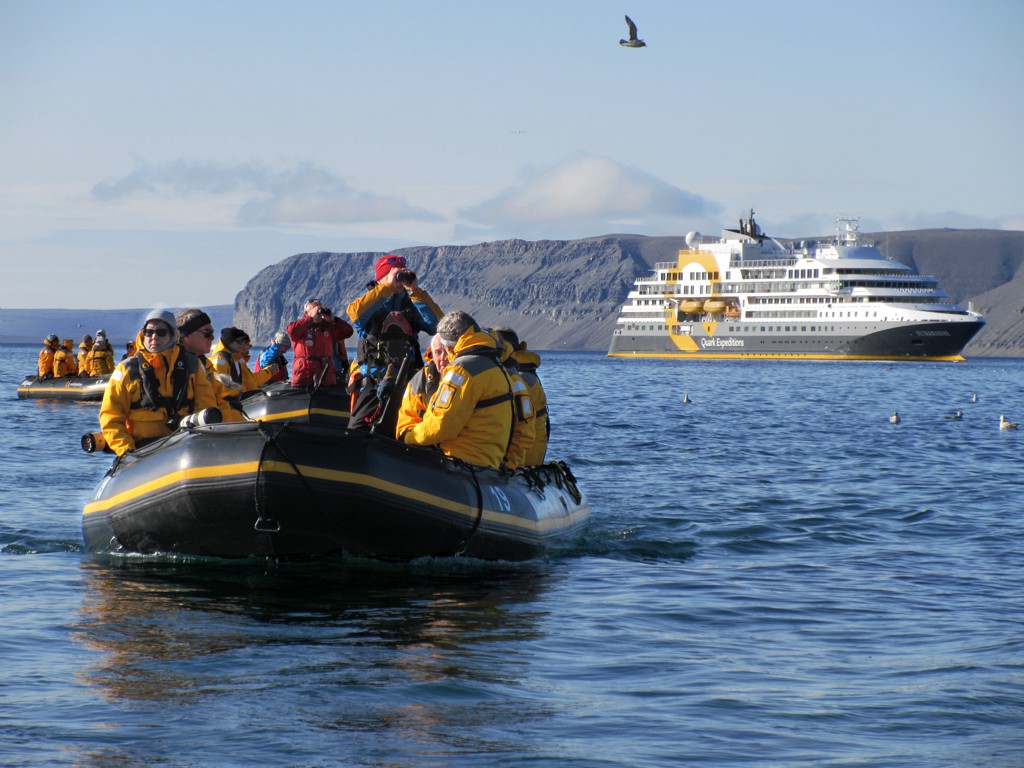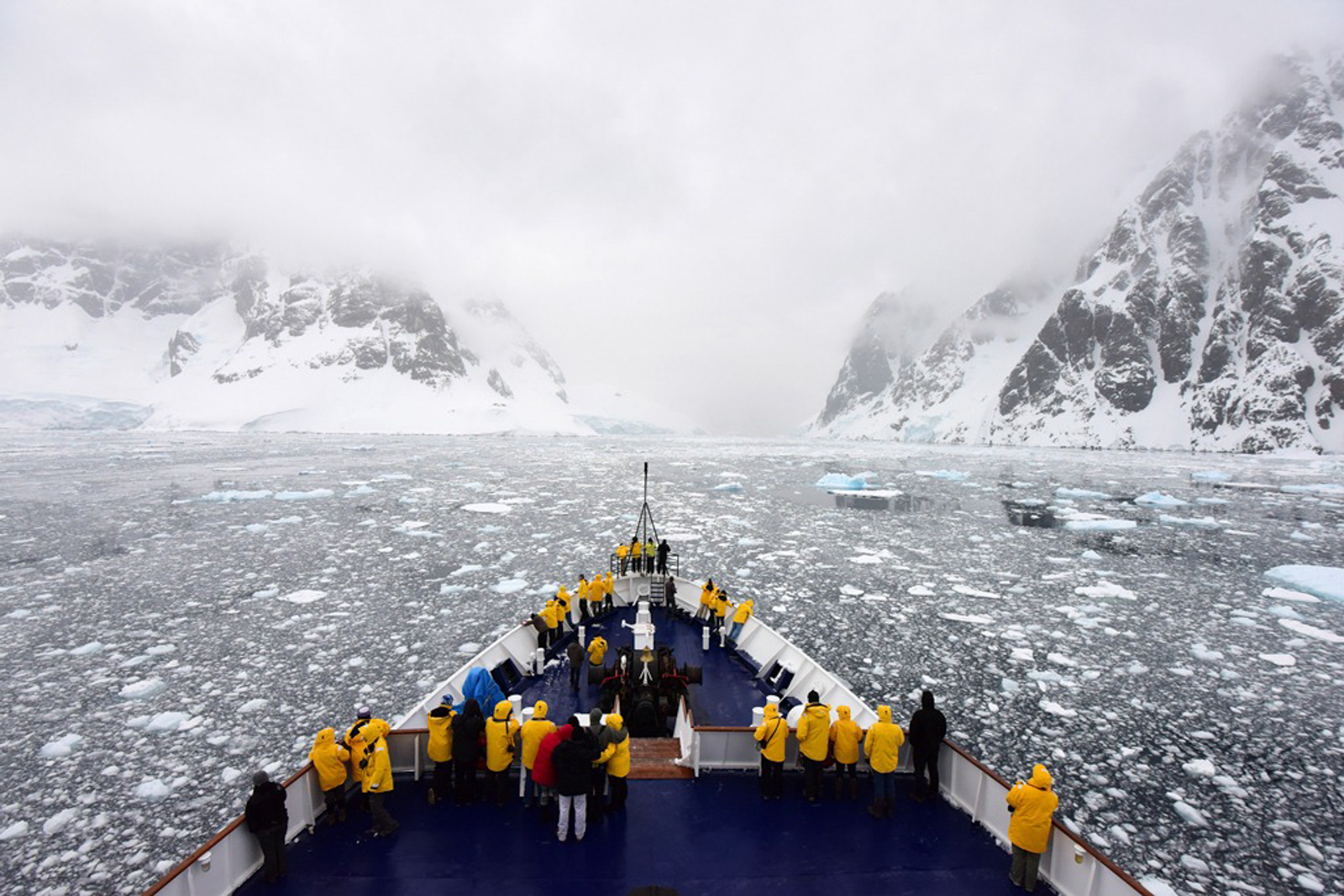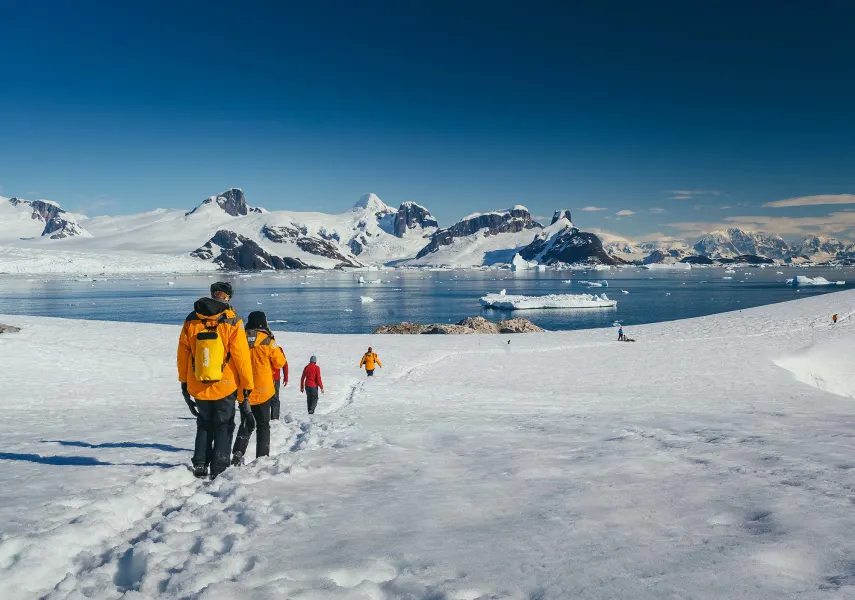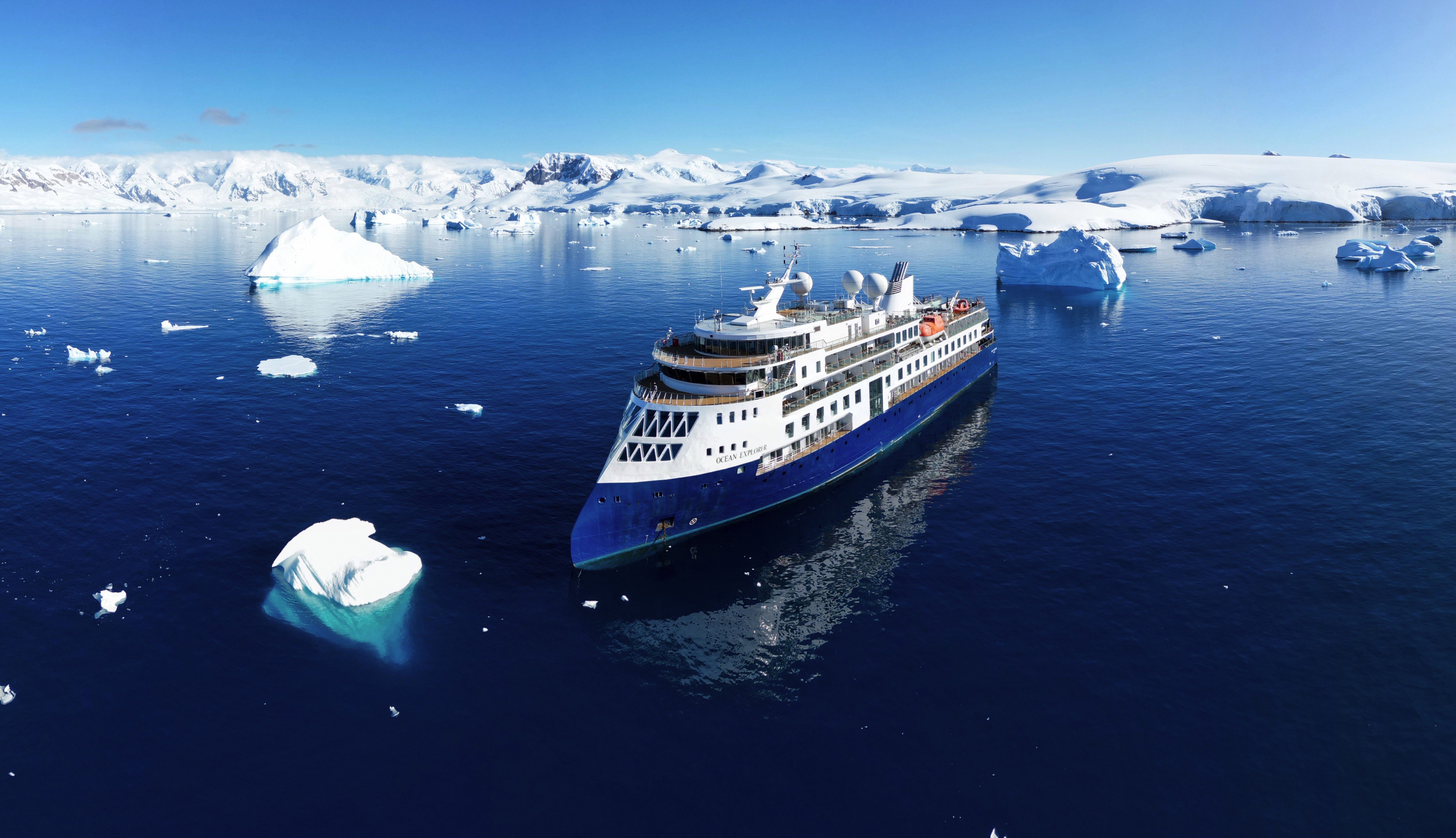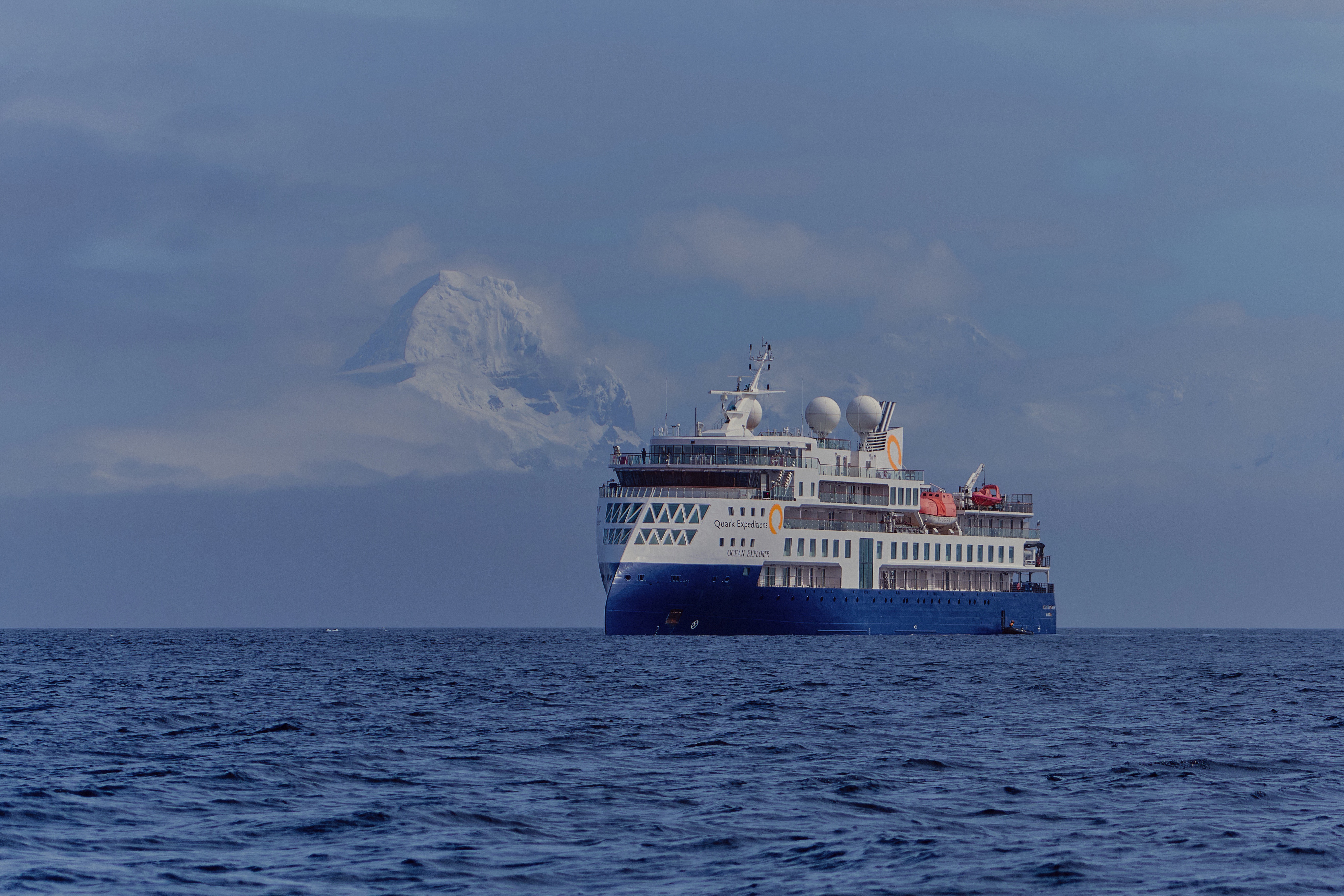Itinerary
A city of the sea, Helsinki was built along a series of oddly shaped peninsulas and islands jutting into the Baltic coast along the Gulf of Finland. Streets and avenues curve around bays, bridges reach to nearby islands, and ferries ply among offshore islands.Having grown dramatically since World War II, Helsinki now absorbs more than one-tenth of the Finnish population. The metro area covers 764 square km (474 square miles) and 315 islands. Most sights, hotels, and restaurants cluster on one peninsula, forming a compact central hub. The greater Helsinki metropolitan area, which includes Espoo and Vantaa, has a total population of more than a million people.Helsinki is a relatively young city compared with other European capitals. In the 16th century, King Gustav Vasa of Sweden decided to woo trade from the Estonian city of Tallinn and thus challenge the Hanseatic League’s monopoly on Baltic trade. Accordingly, he commanded the people of four Finnish towns to pack up their belongings and relocate to the rapids on the River Vantaa. The new town, founded on June 12, 1550, was named Helsinki.For three centuries, Helsinki (Helsingfors in Swedish) had its ups and downs as a trading town. Turku, to the west, remained Finland’s capital and intellectual center. However, Helsinki’s fortunes improved when Finland fell under Russian rule as an autonomous grand duchy. Czar Alexander I wanted Finland’s political center closer to Russia and, in 1812, selected Helsinki as the new capital. Shortly afterward, Turku suffered a disastrous fire, forcing the university to move to Helsinki. The town’s future was secure.Just before the czar’s proclamation, a fire destroyed many of Helsinki’s traditional wooden structures, precipitating the construction of new buildings suitable for a nation’s capital. The German-born architect Carl Ludvig Engel was commissioned to rebuild the city, and as a result, Helsinki has some of the purest neoclassical architecture in the world. Add to this foundation the influence of Stockholm and St. Petersburg with the local inspiration of 20th-century Finnish design, and the result is a European capital city that is as architecturally eye-catching as it is distinct from other Scandinavian capitals. You are bound to discover endless engaging details—a grimacing gargoyle; a foursome of males supporting a balcony’s weight on their shoulders; a building painted in striking colors with contrasting flowers in the windows. The city’s 400 or so parks make it particularly inviting in summer.Today, Helsinki is still a meeting point of eastern and western Europe, which is reflected in its cosmopolitan image, the influx of Russians and Estonians, and generally multilingual population. Outdoor summer bars (“terrassit” as the locals call them) and cafés in the city center are perfect for people watching on a summer afternoon.
Day programme:
Your Arctic adventure begins in Helsinki, renowned for its extraordinary architecture and intriguing mix of eastern and western influences. If you arrive early, explore the many museums, galleries and restaurants, relax at a Finnish sauna or wander the vibrant Design District before retiring at your included hotel.
Longyearbyen is the biggest settlement in Svalbard. Seat of the Norwegian administration, it also has the best services and infrastructure in the archipelago. Located deep in the Adventfjord, a sidearm of the Isfjorden (Icefjord), Longyearbyen’s airport can be used all-year round, but its harbor is blocked by ice in winter. Most shops, hotels, restaurants and a hospital are within easy walking distance of the port. One of the most prominent buildings in town is the UNIS center, where several Norwegian universities have joined forces to operate and offer the northernmost higher education to both Norwegian and international students. Adjacent to UNIS, and well worth a visit, is the Svalbard Museum, covering the natural history and exploitation of Svalbard. Remnants of the former mining activity can be seen all around Longyearbyen and even in town.
Day programme:
After breakfast, the group will transfer to the airport and board our private charter flight to Longyearbyen, Spitsbergen’s largest settlement, as part of the transfer package. As you embark this afternoon, you’ll enjoy great views of the mountainous landscape that serves as a backdrop for this seaside town.
Day programme:
Exploring Spitsbergen, the largest island of the Norwegian Svalbard archipelago, rewards you with austere beauty and opportunities to spot its abundant wildlife. Here, you’ll visit spectacular glacier fronts and tundra in full bloom, with walrus, polar bears and Svalbard reindeer amongst your possible wildlife sightings. Birders will be thrilled to see Arctic terns, skuas, Brünnich’s guillemots, black-legged kittiwakes and ivory gulls. If conditions allow, you could sail within 10 degrees of the North Pole!
Day programme:
Exploring Spitsbergen, the largest island of the Norwegian Svalbard archipelago, rewards you with austere beauty and opportunities to spot its abundant wildlife. Here, you’ll visit spectacular glacier fronts and tundra in full bloom, with walrus, polar bears and Svalbard reindeer amongst your possible wildlife sightings. Birders will be thrilled to see Arctic terns, skuas, Brünnich’s guillemots, black-legged kittiwakes and ivory gulls. If conditions allow, you could sail within 10 degrees of the North Pole!
Day programme:
Exploring Spitsbergen, the largest island of the Norwegian Svalbard archipelago, rewards you with austere beauty and opportunities to spot its abundant wildlife. Here, you’ll visit spectacular glacier fronts and tundra in full bloom, with walrus, polar bears and Svalbard reindeer amongst your possible wildlife sightings. Birders will be thrilled to see Arctic terns, skuas, Brünnich’s guillemots, black-legged kittiwakes and ivory gulls. If conditions allow, you could sail within 10 degrees of the North Pole!
Day programme:
Exploring Spitsbergen, the largest island of the Norwegian Svalbard archipelago, rewards you with austere beauty and opportunities to spot its abundant wildlife. Here, you’ll visit spectacular glacier fronts and tundra in full bloom, with walrus, polar bears and Svalbard reindeer amongst your possible wildlife sightings. Birders will be thrilled to see Arctic terns, skuas, Brünnich’s guillemots, black-legged kittiwakes and ivory gulls. If conditions allow, you could sail within 10 degrees of the North Pole!
Day programme:
During your tour of Greenland’s remote eastern coast, you’ll enjoy Zodiac cruises and shore visits to several locations. Explore the remains of ancient Thule settlements and keep an eye out for grazing muskoxen—40 percent of the world’s muskoxen population lives here. Finally, you will sail through spectacular Scoresbysund, the birthplace of many icebergs and, some say, the most beautiful fjord system in the world. If conditions allow, you may also visit Ittoqqortoormiit, the most remote community in East Greenland.
Day programme:
During your tour of Greenland’s remote eastern coast, you’ll enjoy Zodiac cruises and shore visits to several locations. Explore the remains of ancient Thule settlements and keep an eye out for grazing muskoxen—40 percent of the world’s muskoxen population lives here. Finally, you will sail through spectacular Scoresbysund, the birthplace of many icebergs and, some say, the most beautiful fjord system in the world. If conditions allow, you may also visit Ittoqqortoormiit, the most remote community in East Greenland.
Day programme:
During your tour of Greenland’s remote eastern coast, you’ll enjoy Zodiac cruises and shore visits to several locations. Explore the remains of ancient Thule settlements and keep an eye out for grazing muskoxen—40 percent of the world’s muskoxen population lives here. Finally, you will sail through spectacular Scoresbysund, the birthplace of many icebergs and, some say, the most beautiful fjord system in the world. If conditions allow, you may also visit Ittoqqortoormiit, the most remote community in East Greenland.
Day programme:
During your tour of Greenland’s remote eastern coast, you’ll enjoy Zodiac cruises and shore visits to several locations. Explore the remains of ancient Thule settlements and keep an eye out for grazing muskoxen—40 percent of the world’s muskoxen population lives here. Finally, you will sail through spectacular Scoresbysund, the birthplace of many icebergs and, some say, the most beautiful fjord system in the world. If conditions allow, you may also visit Ittoqqortoormiit, the most remote community in East Greenland.
Sprawling Reykjavík, the nation’s nerve center and government seat, is home to half the island’s population. On a bay overlooked by proud Mt. Esja (pronounced eh-shyuh), with its ever-changing hues, Reykjavík presents a colorful sight, its concrete houses painted in light colors and topped by vibrant red, blue, and green roofs. In contrast to the almost treeless countryside, Reykjavík has many tall, native birches, rowans, and willows, as well as imported aspen, pines, and spruces.Reykjavík’s name comes from the Icelandic words for smoke, reykur, and bay, vík. In AD 874, Norseman Ingólfur Arnarson saw Iceland rising out of the misty sea and came ashore at a bay eerily shrouded with plumes of steam from nearby hot springs. Today most of the houses in Reykjavík are heated by near-boiling water from the hot springs. Natural heating avoids air pollution; there’s no smoke around. You may notice, however, that the hot water brings a slight sulfur smell to the bathroom.Prices are easily on a par with other major European cities. A practical option is to purchase a Reykjavík City Card at the Tourist Information Center or at the Reykjavík Youth Hostel. This card permits unlimited bus usage and admission to any of the city’s seven pools, the Family Park and Zoo, and city museums. The cards are valid for one (ISK 3,300), two (ISK 4,400), or three days (ISK 4,900), and they pay for themselves after three or four uses a day. Even lacking the City Card, paying admission (ISK 500, or ISK 250 for seniors and people with disabilities) to one of the city art museums (Hafnarhús, Kjarvalsstaðir, or Ásmundarsafn) gets you free same-day admission to the other two.
Day programme:
You’ll disembark in Reykjavik, Iceland’s capital, at the end of your journey. If you have booked post-expedition accommodation, we provide a transferto a central downtown location.
Ship features

Owners Suite
This palatial, airy apartment offers stunning views from its large private veranda on the highest cabin level. The luxurious suite features a large master bedroom, living room and dining area and two large master bathrooms, among other amenities.
Bed Config.
Two rooms. One double bed made up of two twin berths fold out sofa bed
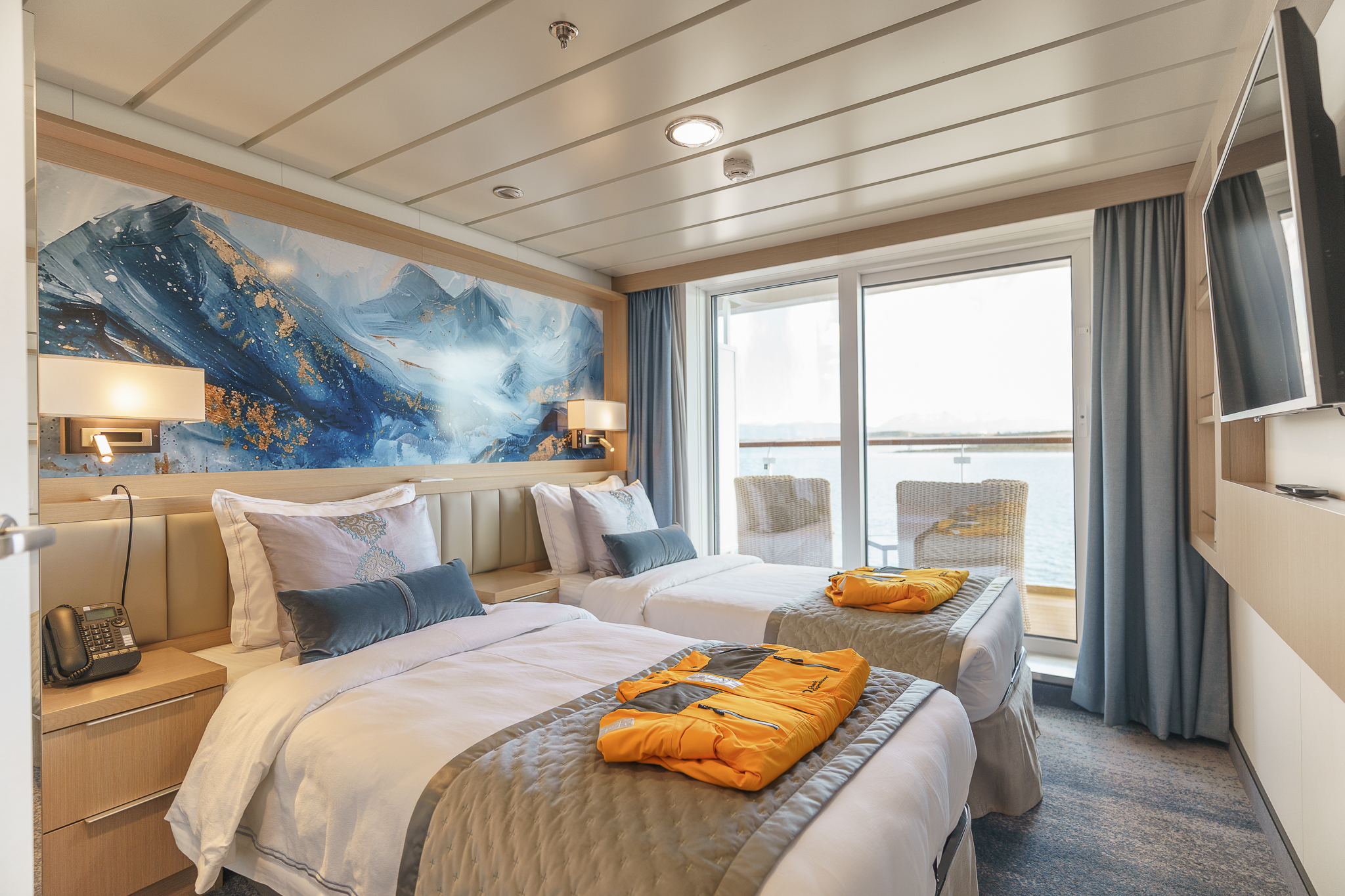
Junior Suite
Located on Deck 6 and approximately 298 sq. f. (27.7 sq. m,) in size. These 2-room suites have one double bed that can be configured into two singles in the inner bedroom and an outer sitting room furnished with a sofa-bed, and activity table for two. From the bedroom there a floor to ceiling glass view that opens to a double sized walkout balcony. There are also 2 TV’s, state of the art ‘infotainment’ system and private bathroom with bathtub, vanity and heated floor.
Bed Config.
Two rooms. One double bed made up of two twin berths fold out sofa bed
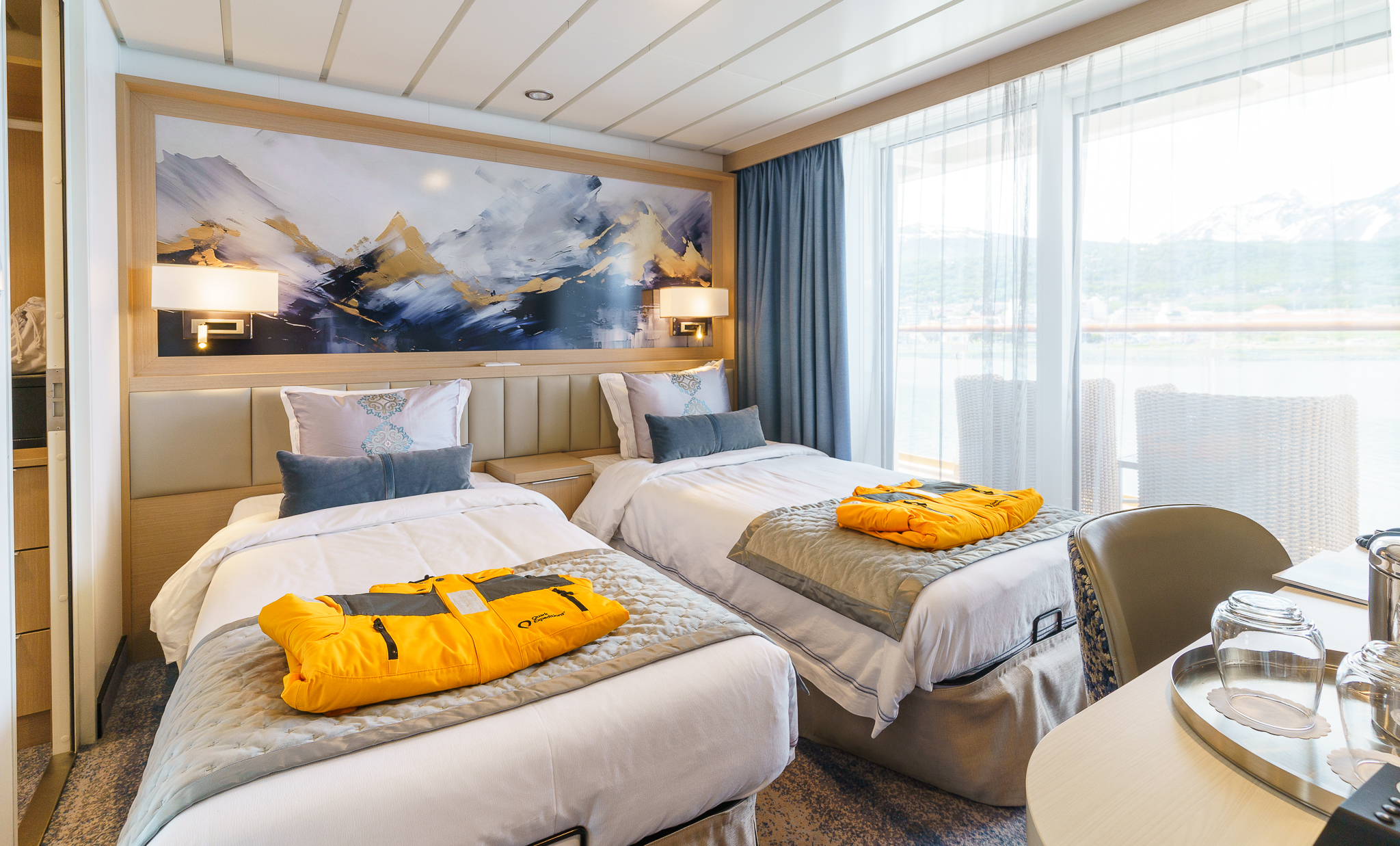
Penthouse Suite
This unique 2-room suite is located on Deck 7 and is approximately 269 sq. f (25.0 sq. m.) in size. It has one double bed that can be configured into two singles in the inner bedroom.and the outer sitting area is furnished with a sofa-bed. Walk-out from either room to a double sized balcony . There are also 2 TV’s, state of the art ‘infotainment’ system and private bathroom with shower, vanity and heated floor. And an additional powder room in the outside sitting area.
Bed Config.
Two rooms. One double bed made up of two twin berths fold out sofa bed
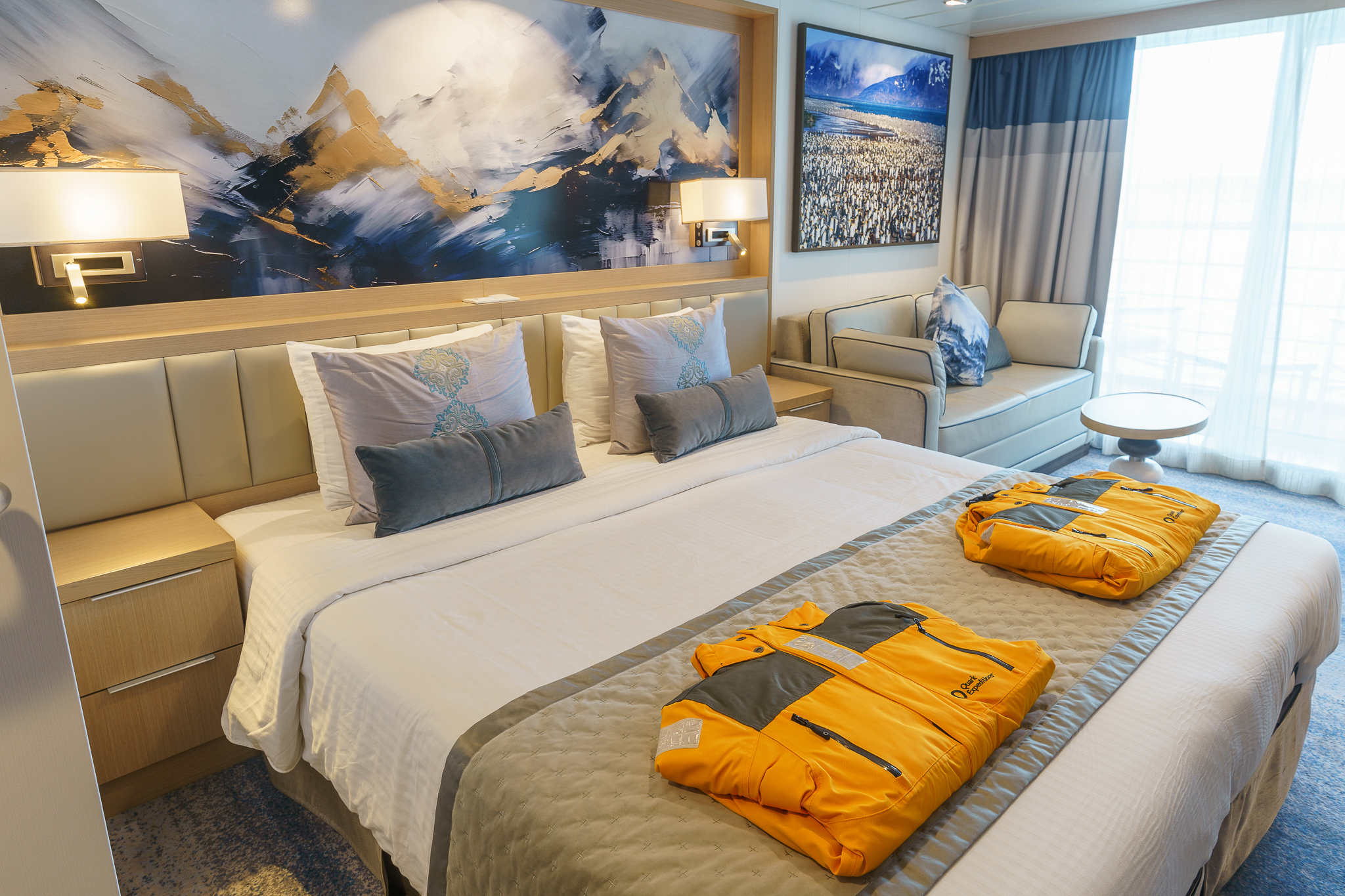
Veranda Suite
Located throughout the ship and approximately 205 sq. ft. (19.2 sq. m,) in size, these cabins have one double bed that can be configured into two singles, and seperate sitting area furnished with a sofa-bed. There is a floor to ceiling glass view that opens to a walkout balcony. There is also a desk and chair, TV, state of the art ‘infotainment’ system and private bathroom with shower, vanity and heated floor.
Bed Config.
One double bed made up of two twin berths and fold out sofa bed
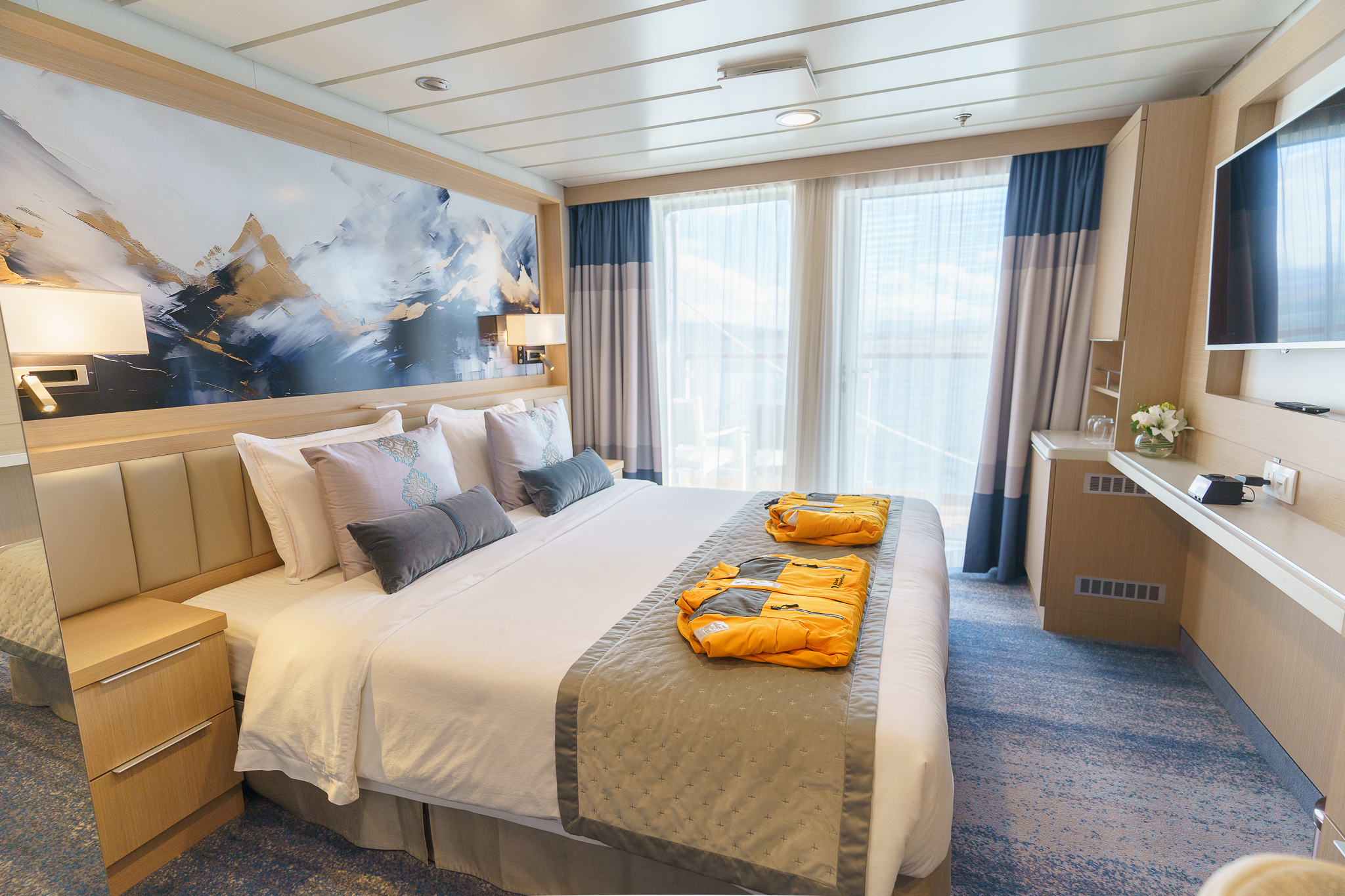
Veranda Stateroom
Located throughout the ship and approximately 208 sq. f. (19.3 sq. m,) in size, these cabins have one double bed that can be configured into two singles, and seperate sitting area furnished with two club chairs and a reading table. There is a floor to ceiling glass view that opens to a walkout balcony. There is also a desk and chair, TV, state of the art ‘infotainment’ system and private bathroom with shower, vanity and heated floor. Note: 611 and 612 do not have the club chairs and a reading table.
Bed Config.
One double bed made up of two twin berths
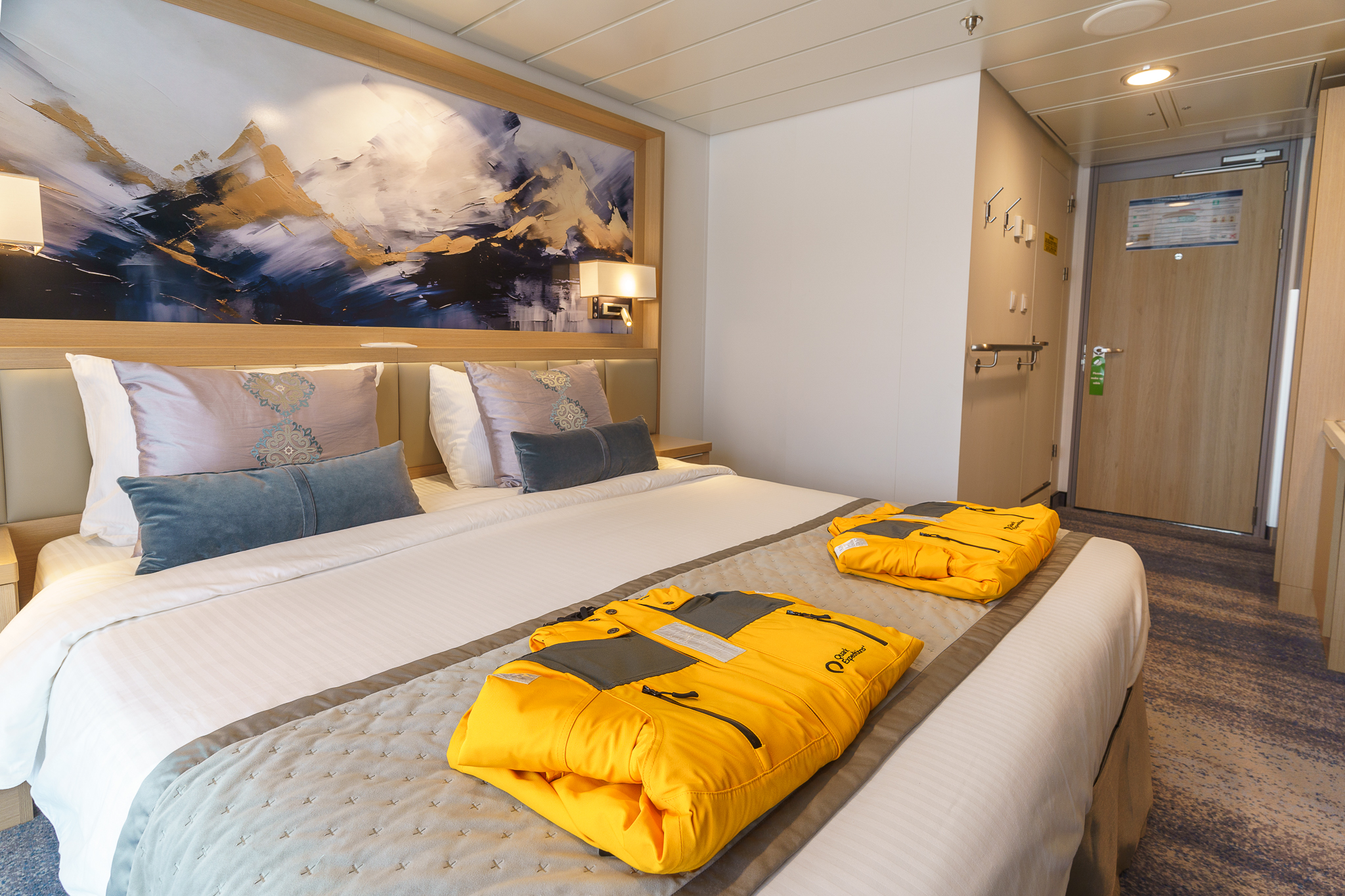
Deluxe Veranda Forward
Located on Deck 4 and approximately 182 sq. f. (16.9 sq. m,) in size, these cabins have one double bed that can be configured into two singles. There is a floor to ceiling glass view that opens to a walkout balcony. There is also a desk and chair, TV, state of the art ‘infotainment’ system and private bathroom with shower, vanity and heated floor.
Bed Config.
One double bed made up of two twin berths
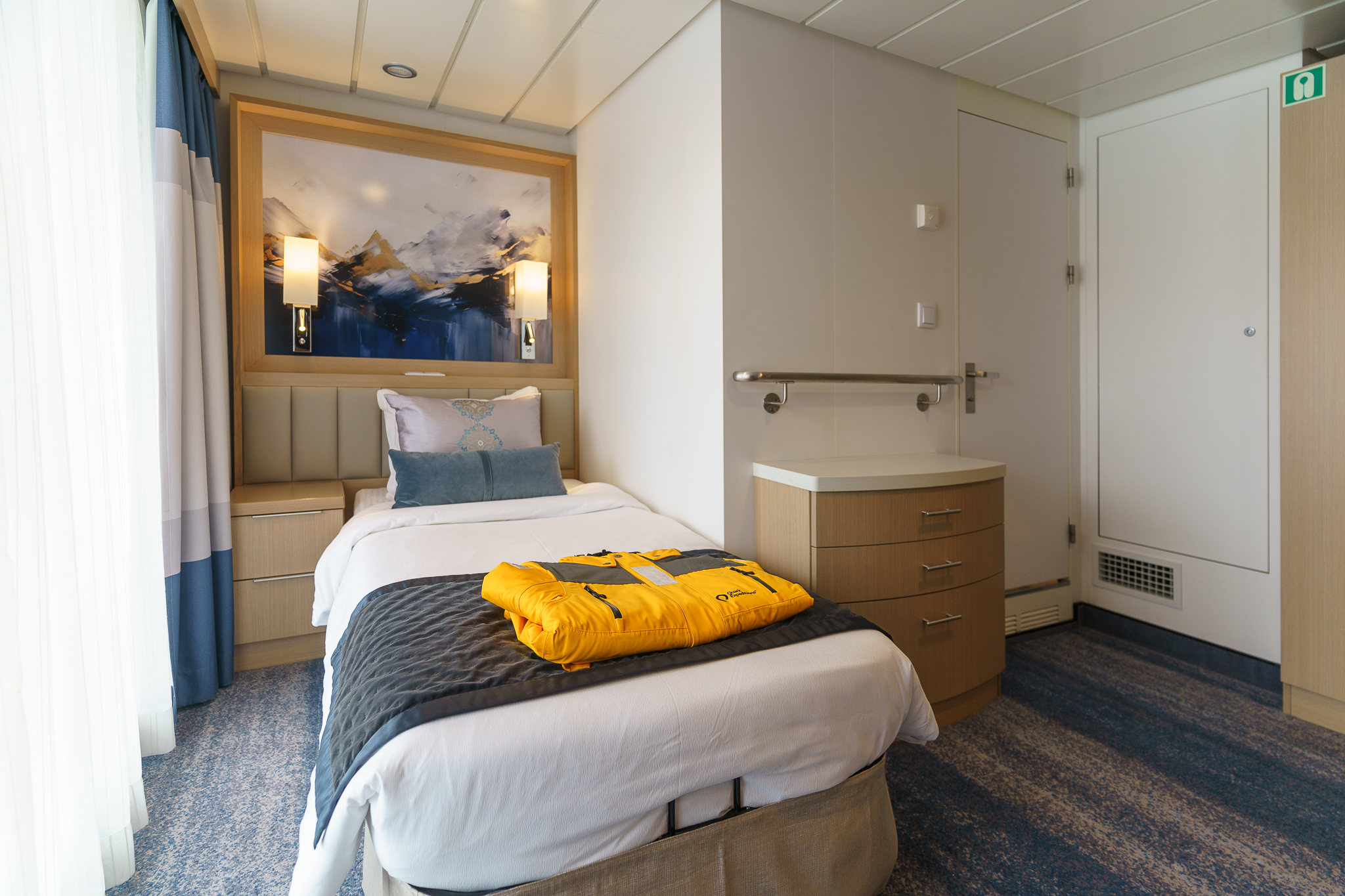
Studio Veranda Single
Designed for one. This unique cabin is located on Deck 7 and approximately 162 sq. f. (15.1 sq. m.). It has one twin bed with a floor to ceiling glass view that opens to a generous walkout balcony. There is also TV, state of the art ‘infotainment’ system and private bathroom with shower, vanity and heated floor.
Bed Config.
One twin single
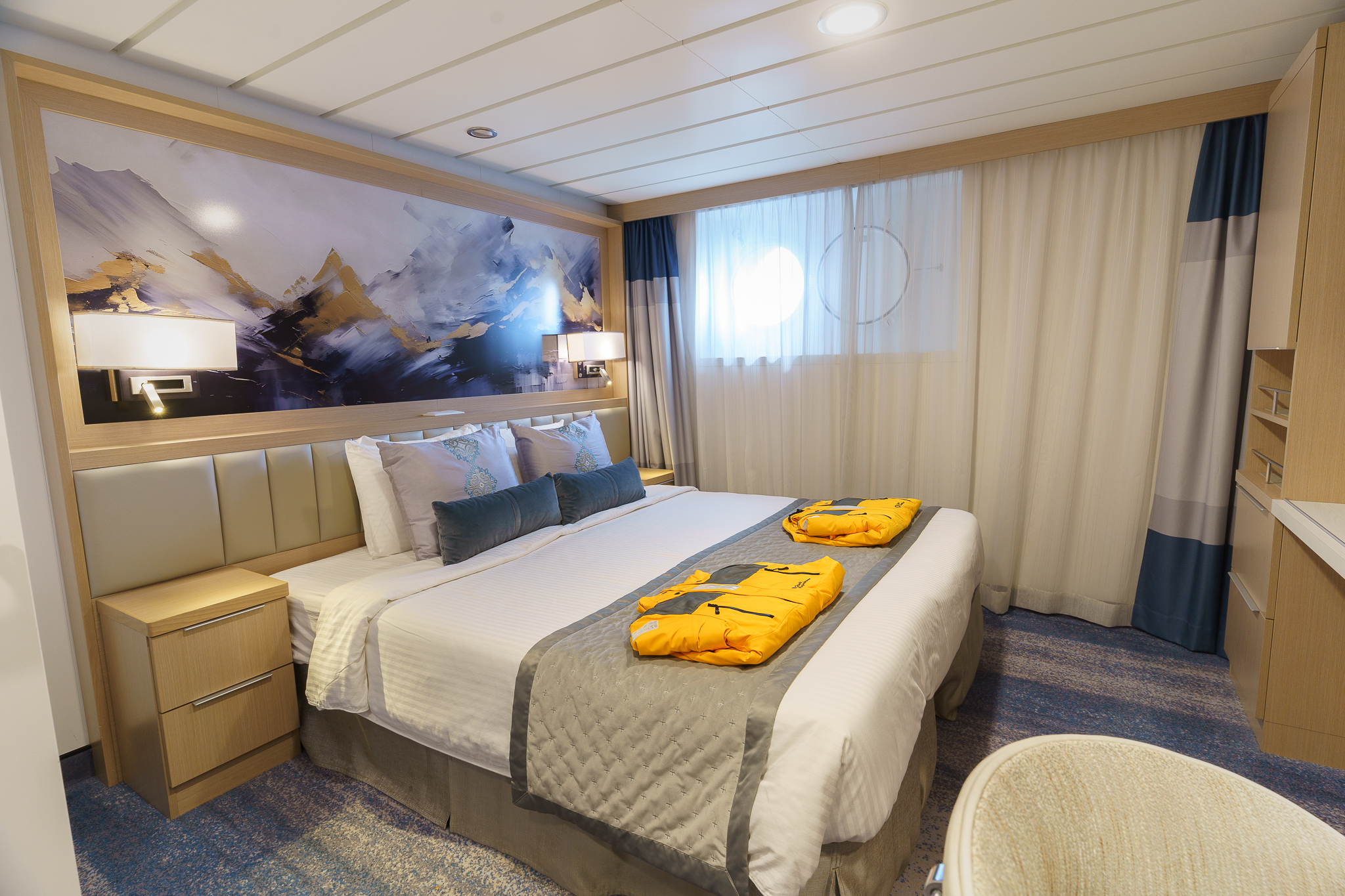
Studio Single
Designed for one. These cabins are located on Deck 3 and approximately 166 sq. ft. (15,4 sq. m,) in size, with one double bed and a porthole view. There is also a desk and chair, TV, state of the art ‘infotainment’ system and private bathroom with shower, vanity and heated floor.
Bed Config.
One double bed made up of two twin berths
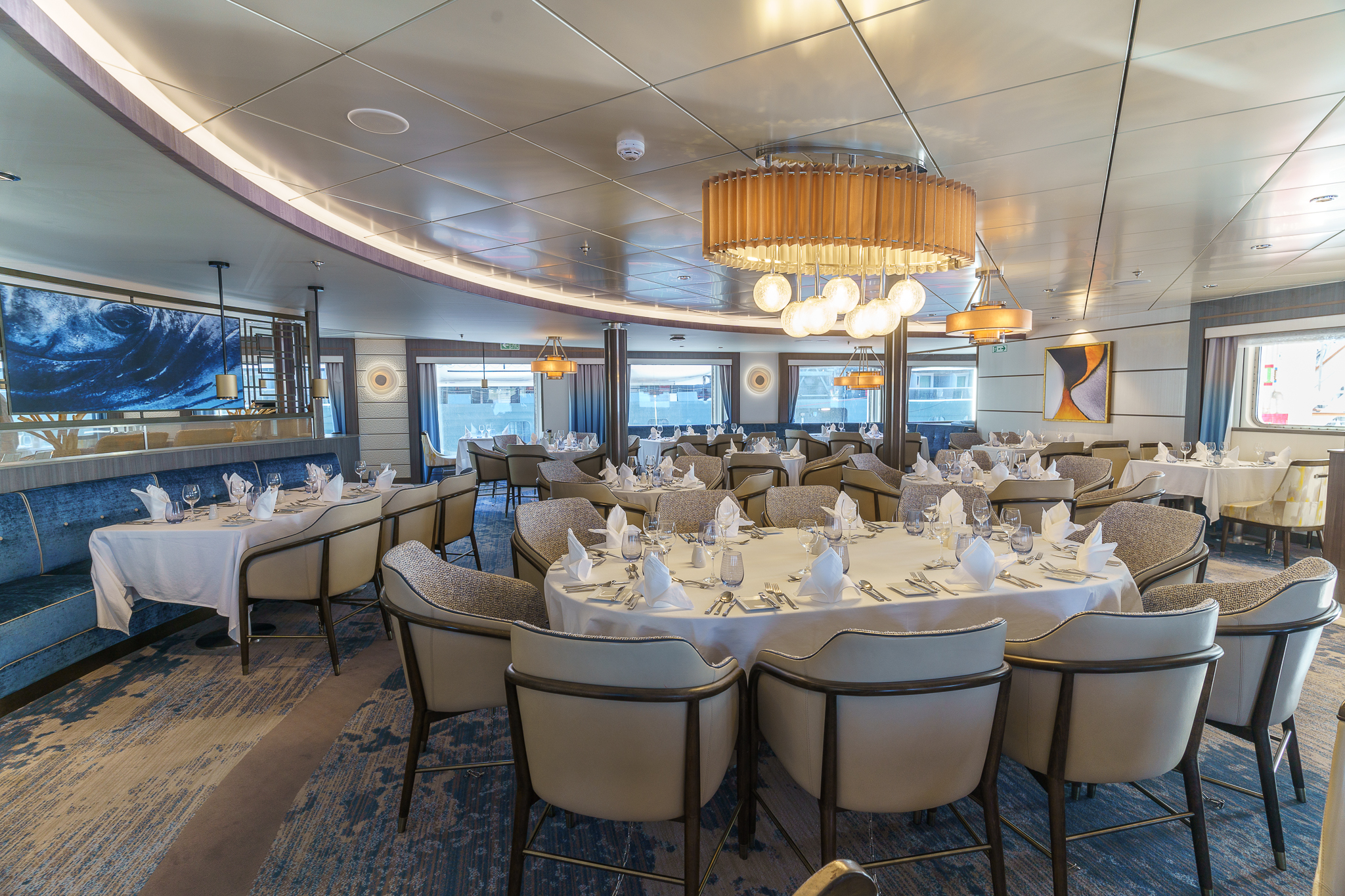
Main Dining Room
Contemporary meets cozy in this modern dining room with its stylish lighting and contemporary art. Located on Deck 5, the Main Dining Room seats 144 guests, and features expansive floor-to-ceiling windows that open onto the spectacular polar wilderness.
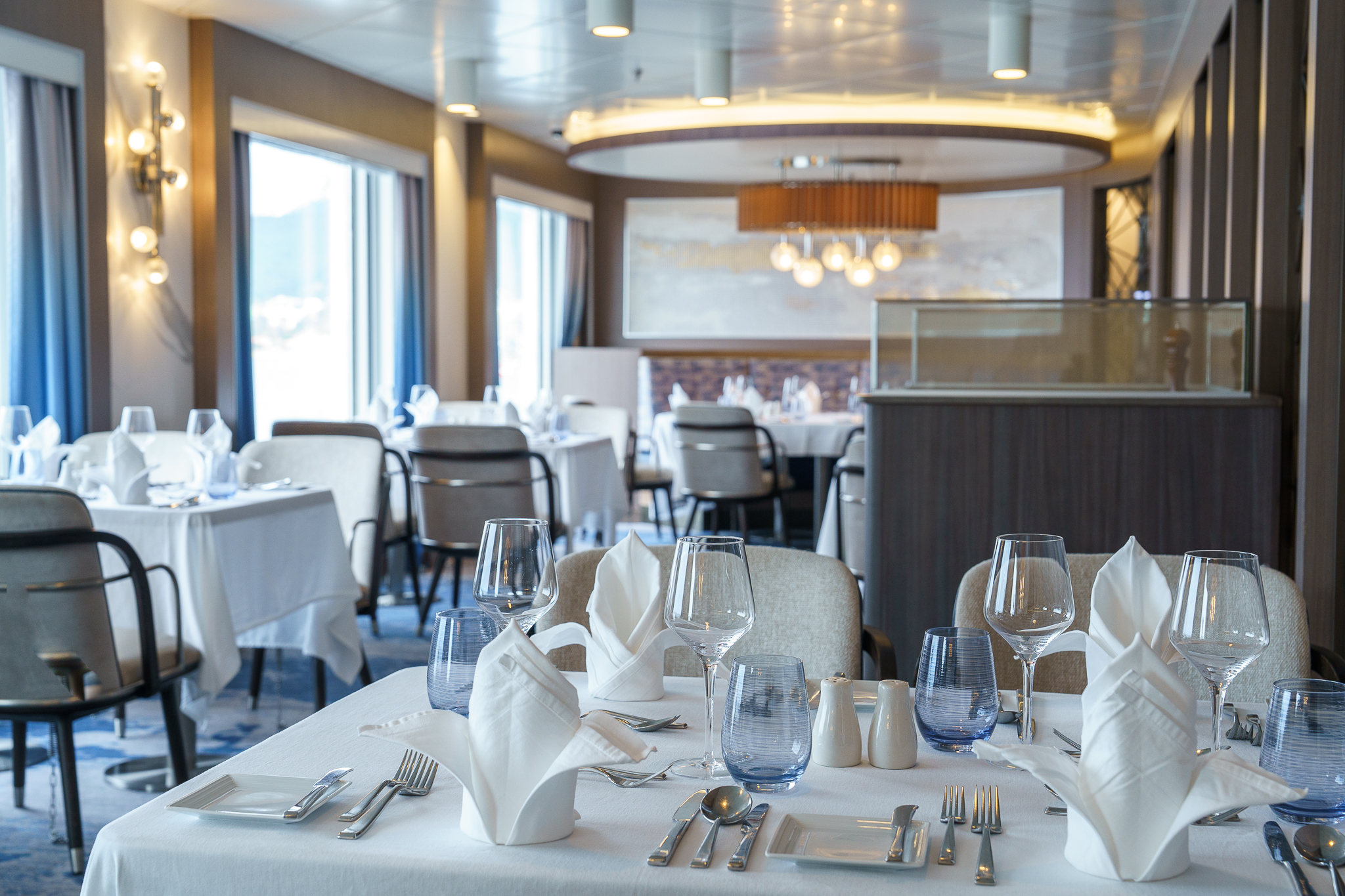
Private Dining Room
Tasteful and intimate. This stylish, private dining room on deck 5 provides a relaxed dining experience—with views of the polar landscape—for up to 36 guests.
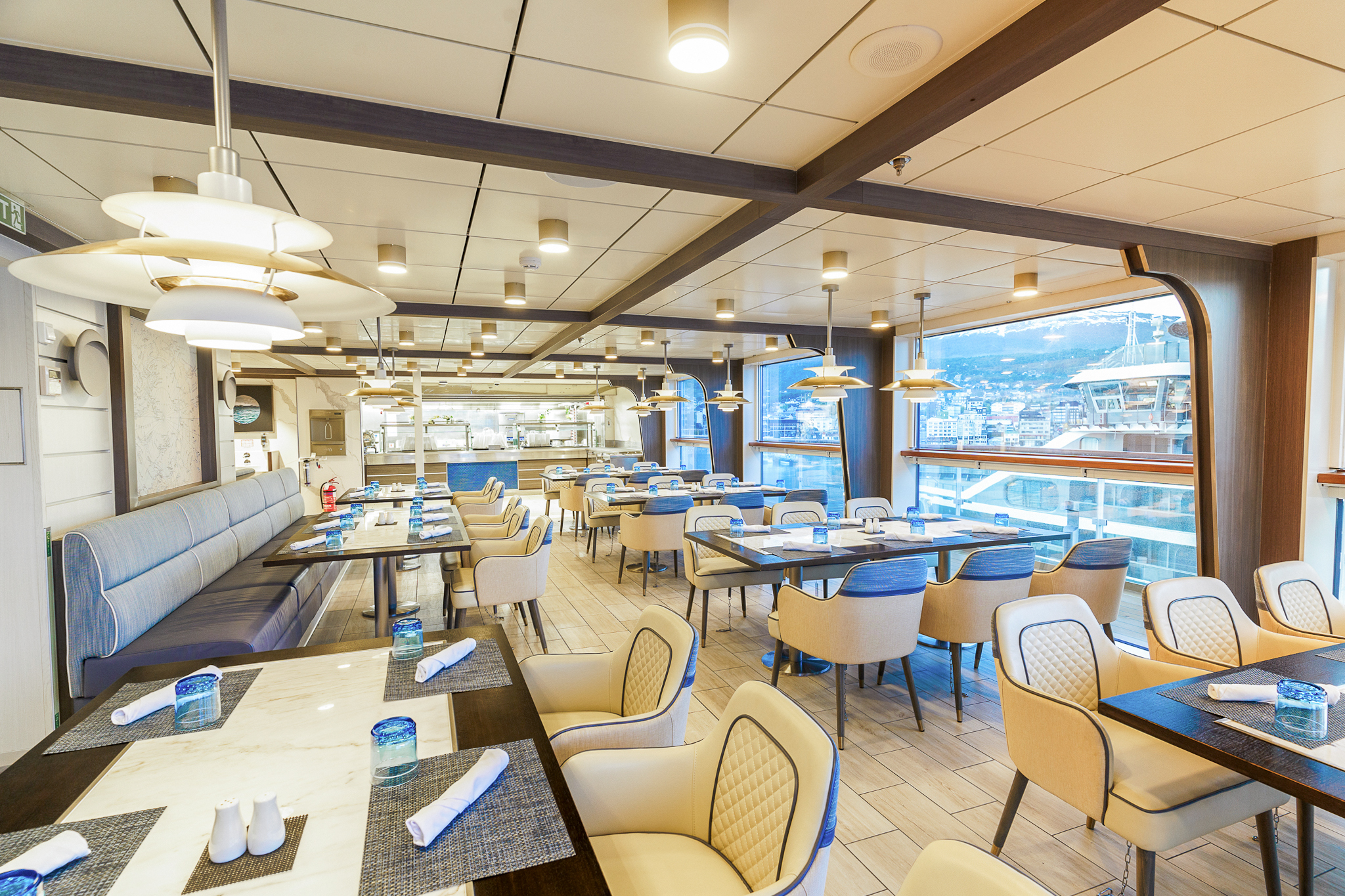
Observation Bistro
With its marine blue and off-white colors—is your go-to spot for lighter fare and graband-go snacks. This relaxed eatery seats up to 44 guests, who can take in full views of their polar surroundings and wildlife while enjoying a light bite.
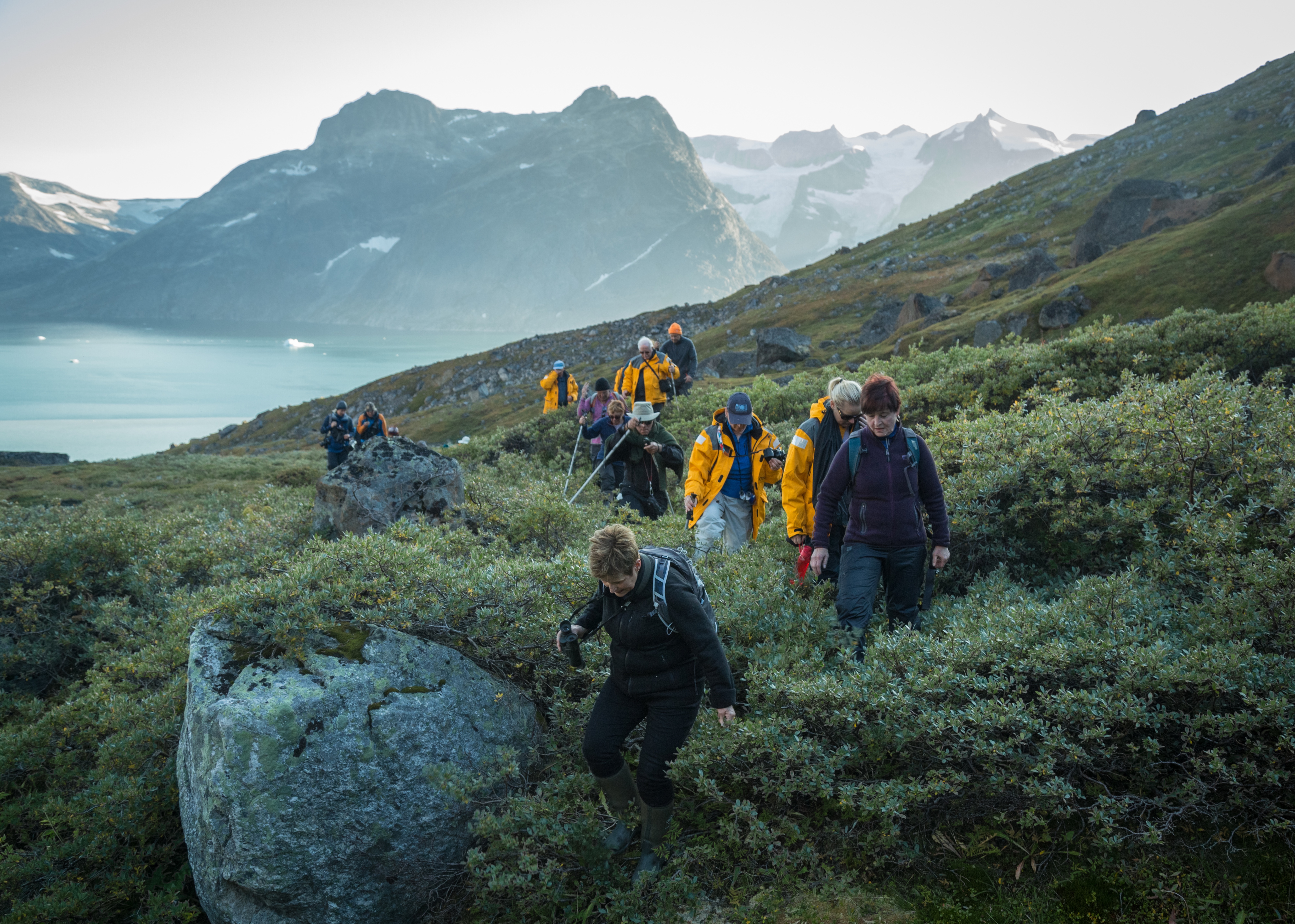
Off-Ship Adventures
With four separate sea-level embarkation points and a fleet of 15 Zodiacs, Ocean Explorer offers a comprehensive breadth of off-ship activities including Zodiac cruising and paddling, allowing you to intimately connect with the polar wilderness.
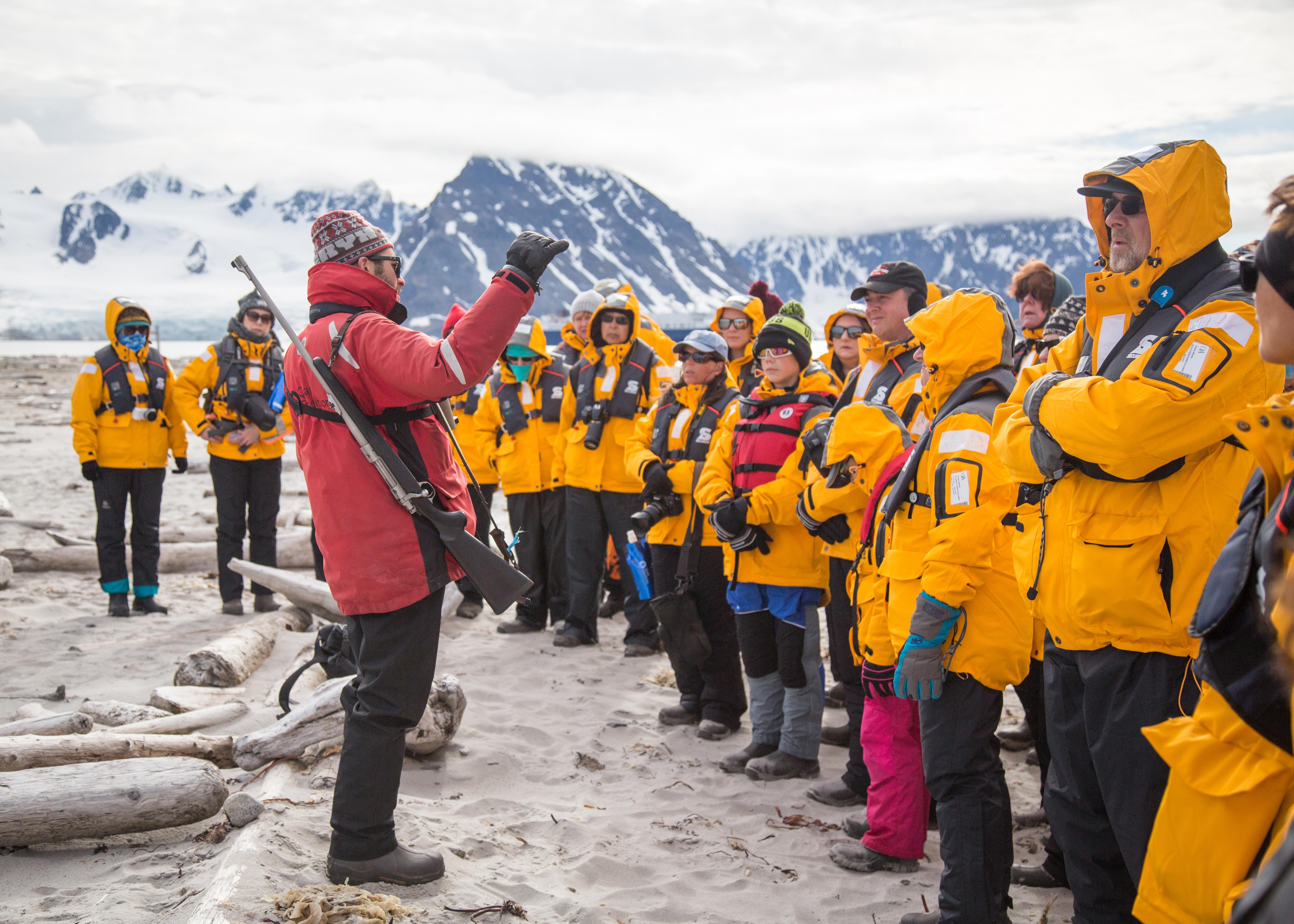
Expedition Team
The perfect polar expedition doesn’t just happen. It takes a team of talented, knowledgeable and experienced professionals to bring it all together. Our Expedition Team is comprised of seasoned veterans with rich backgrounds in marine biology, history, glaciology, geology and more. With the highest staff-to-guest ratio in the industry, our Expedition Teams safely deliver your trip-of-a-lifetime to maximize your polar adventure every step of the way.
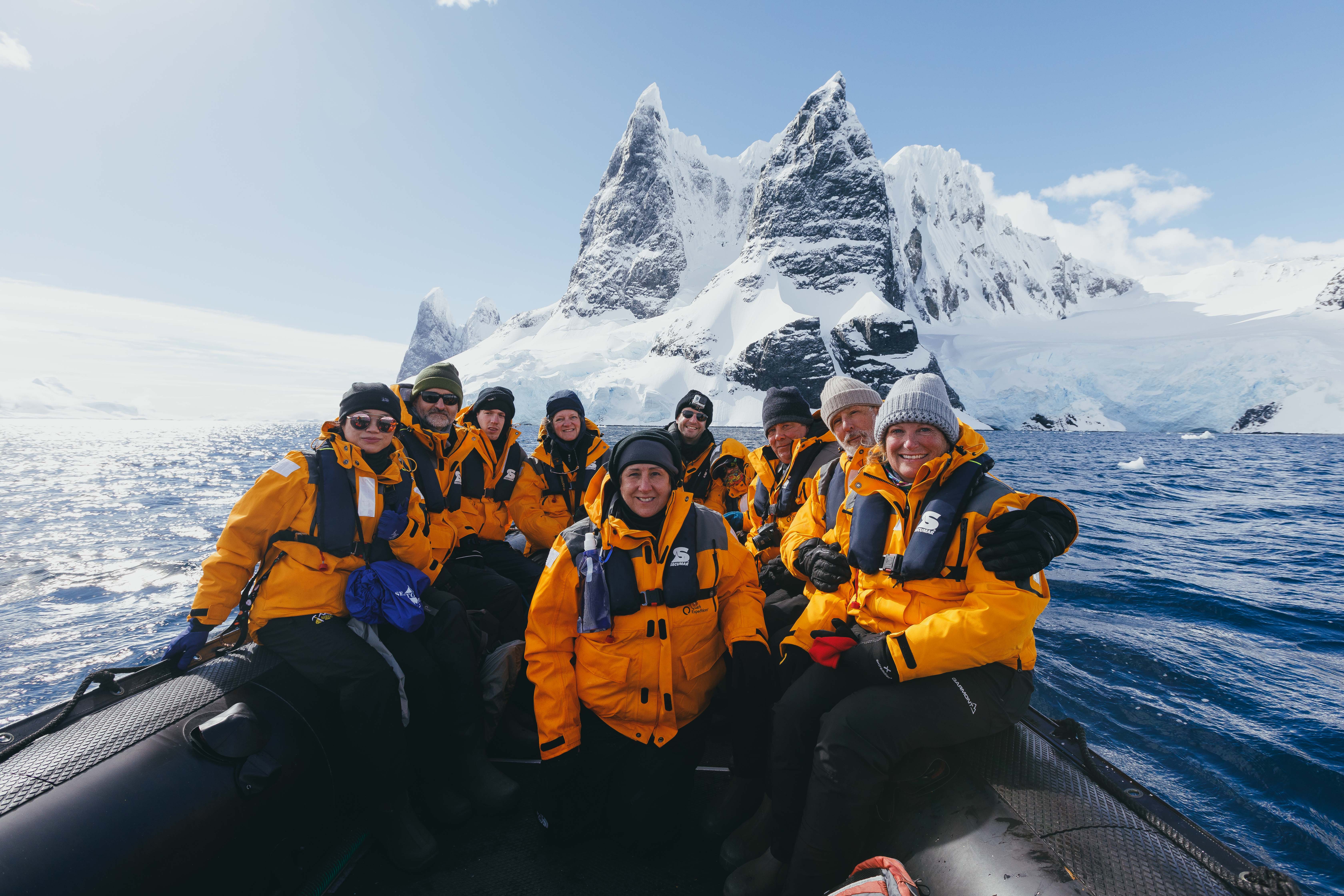
Zodiac Cruising
Zodiacs are used for transferring you ashore, transporting your luggage when necessary and for taking you ocean-level cruising among icebergs, whales and seabirds. During the expedition, you will visit remote and isolated sites that are accessible only by Zodiac.
These large, heavy-duty inflatable vessels are extremely safe and were specially designed for expedition work. Zodiacs are the workhorses of Polar expeditions. Separate air compartments retain a large reserve of buoyancy even if these sturdy boats are damaged. Their flat bottom design permits the craft to land directly onto the cobble and ice-strewn beaches that you will encounter on your Polar expedition.
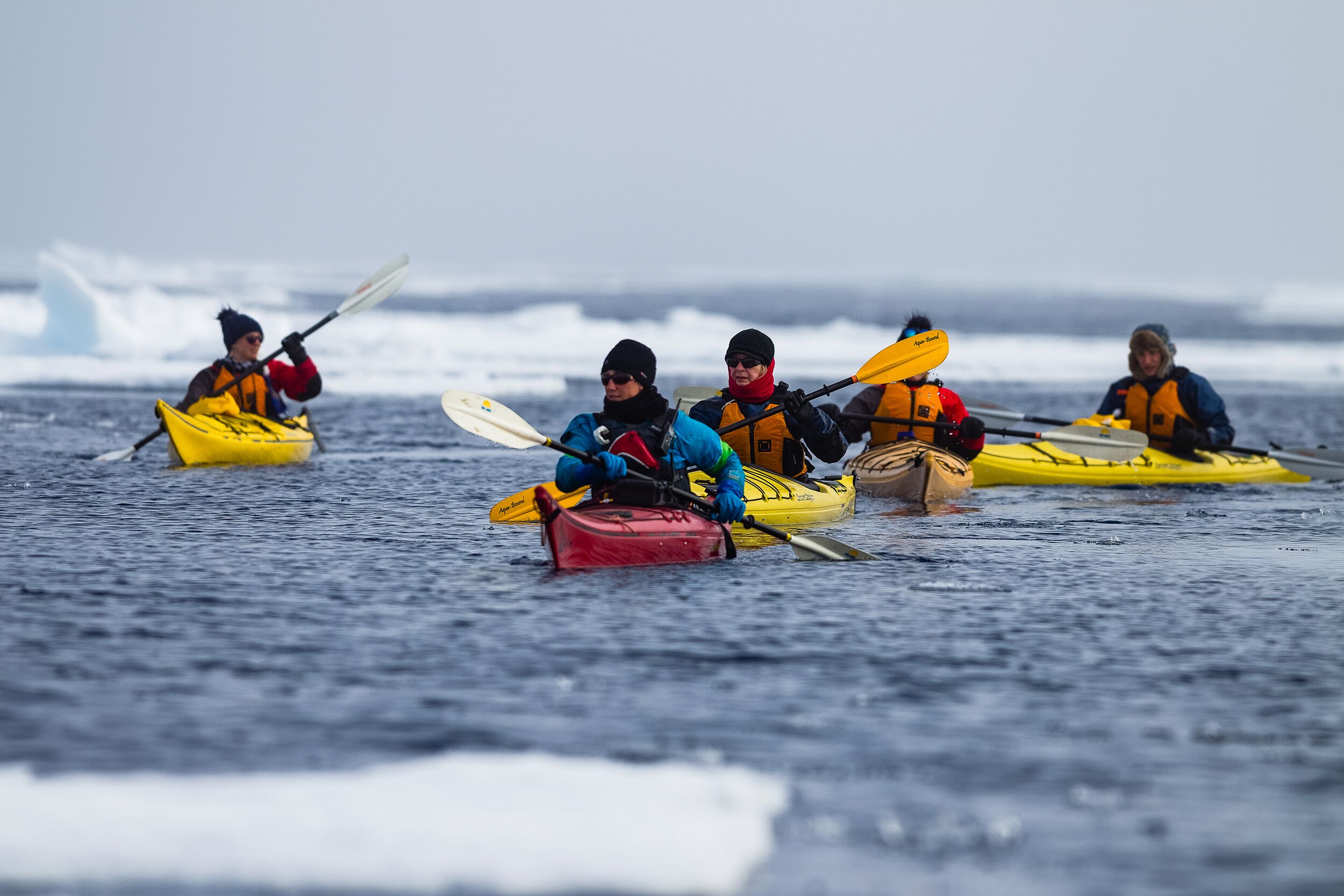
Sea Kayaking
Sea kayaking is offered on all of our departures and you require no previous experience to enjoy this activity. Our sea kayaks are the ideal means by which to get some good exercise and explore the cliffs and shores of the various visitor sites around the archipelago. A typical cruise week offers great opportunities to go kayaking around secluded coves, shores, mangrove estuaries and beautiful beaches. Galapagos penguins, flightless cormorants, sea lions and many other animals can be seen up close on a kayak and even as they swim.
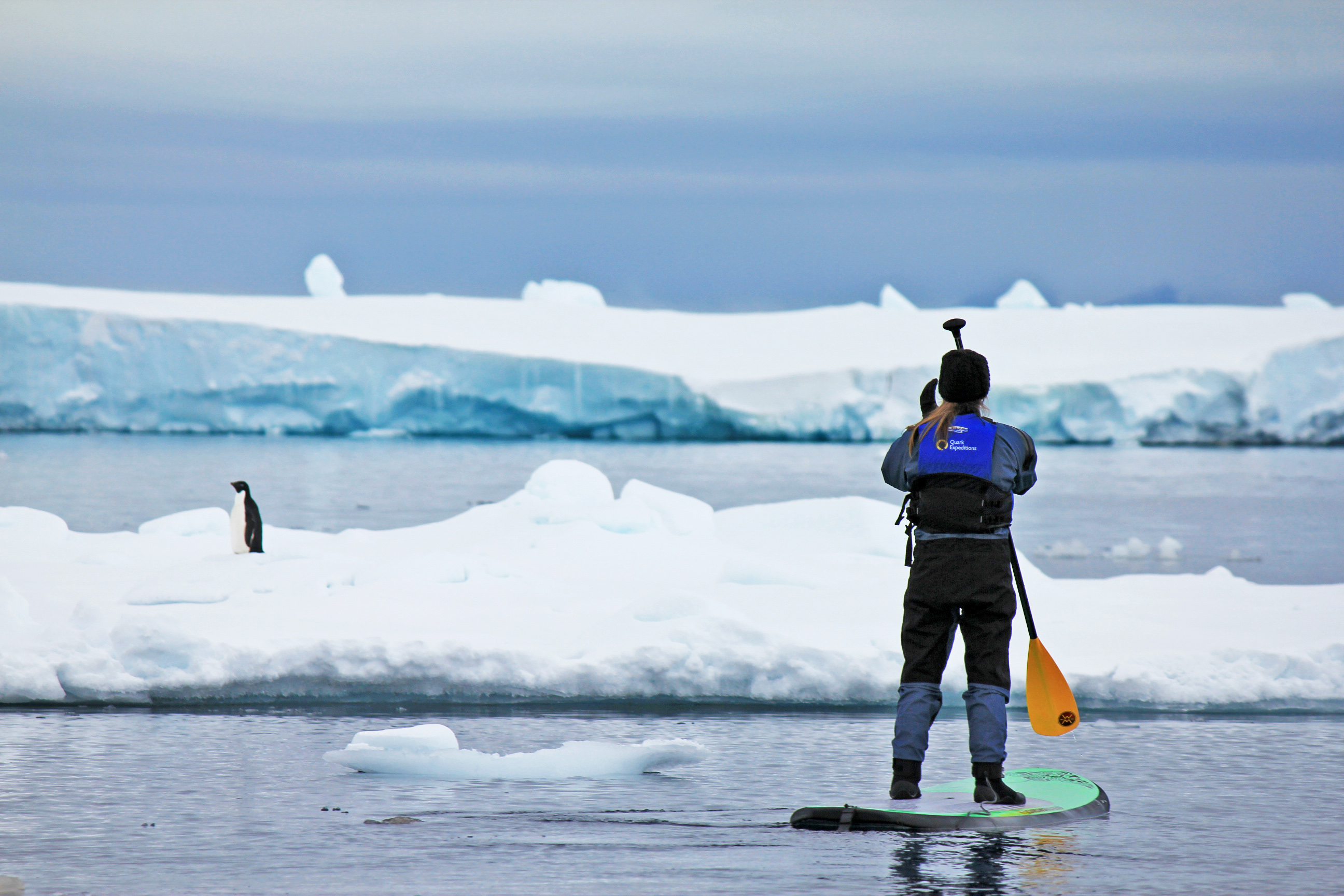
Stand-up Paddleboarding
Stand-up Paddleboarding, popularly known as SUPing, originated in Hawaii. Quark Expeditions is the first company to bring this watersport all the way to Antarctica.
SUPing combines the immersive experience of kayaking but in a standing position. Participants, if they prefer, can kneel, sit or even lie down and stare up at the azure Antarctic sky. Because of their wide base and tail fins, SUP boards are quite stable, enabling participants – after a bit of practice – to stop staring at their feet and admire the surrounding scenery. Imagine seeing Gentoo penguins gliding below you, or making eye contact with a Weddell seal lying on a piece of ice as you paddle by.
Guests receive on-ship and on-water instruction from a qualified SUP guide. In addition, a safety driver (in a Zodiac) stays within range to offer assistance.
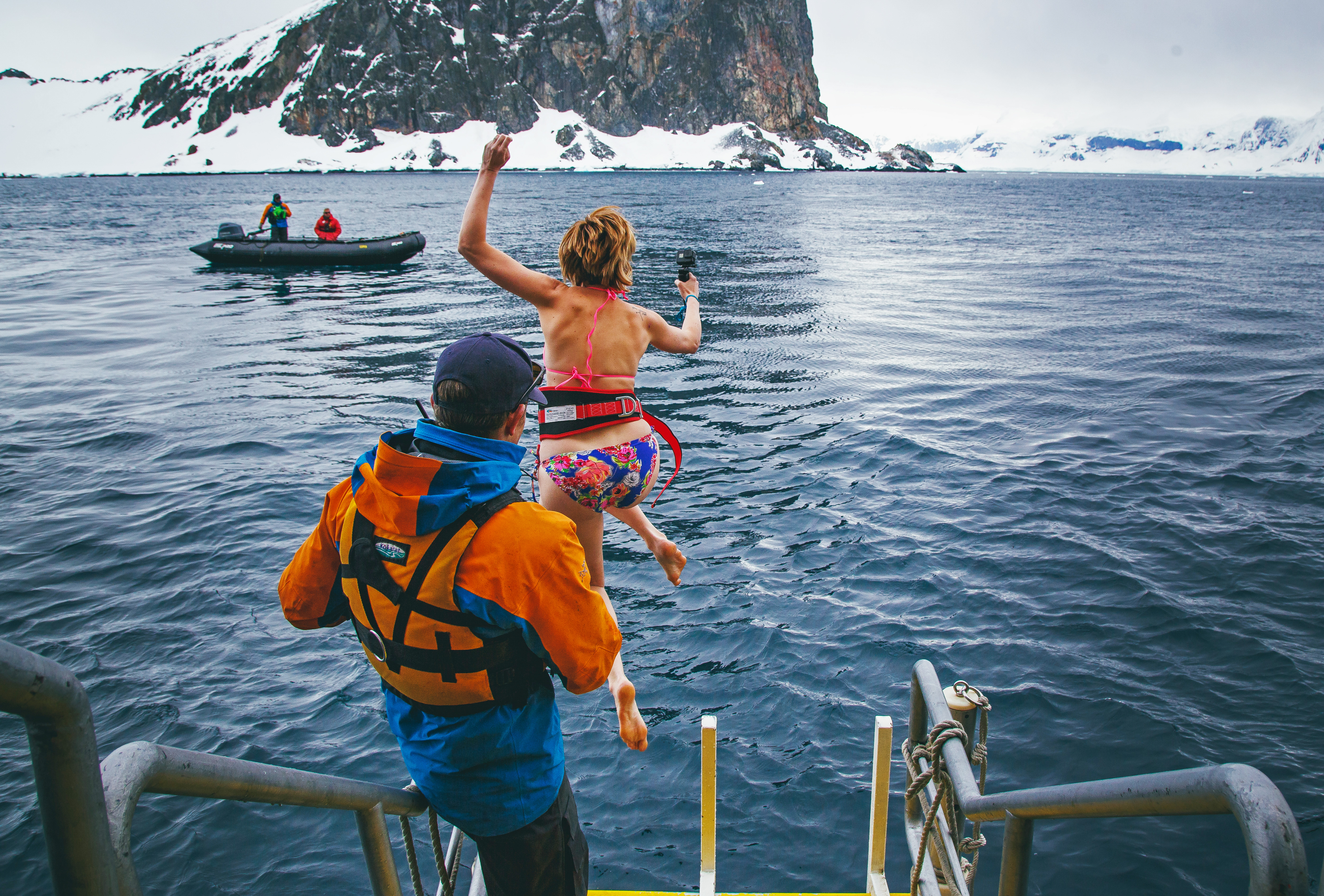
Polar Plunge
The Polar Plunge is scheduled once during each voyage. Throughout the journey, the Expedition Leader and Captain constantly monitor conditions in order to choose the optimal time and location. The Polar Plunge sometimes takes place onshore or, in many cases, from the gangway or Zodiac. All participants wear a tethered harness and plunge into the polar waters from the side of Zodiac or safety of the gangplank cheered on, of course, by fellow passengers and Expedition Team.
Safety is paramount—the onboard physician always attends the Polar Plunge. Guides in survival gear circle the area in Zodiacs as guests take their turn jumping or cannon-balling into the polar waters.
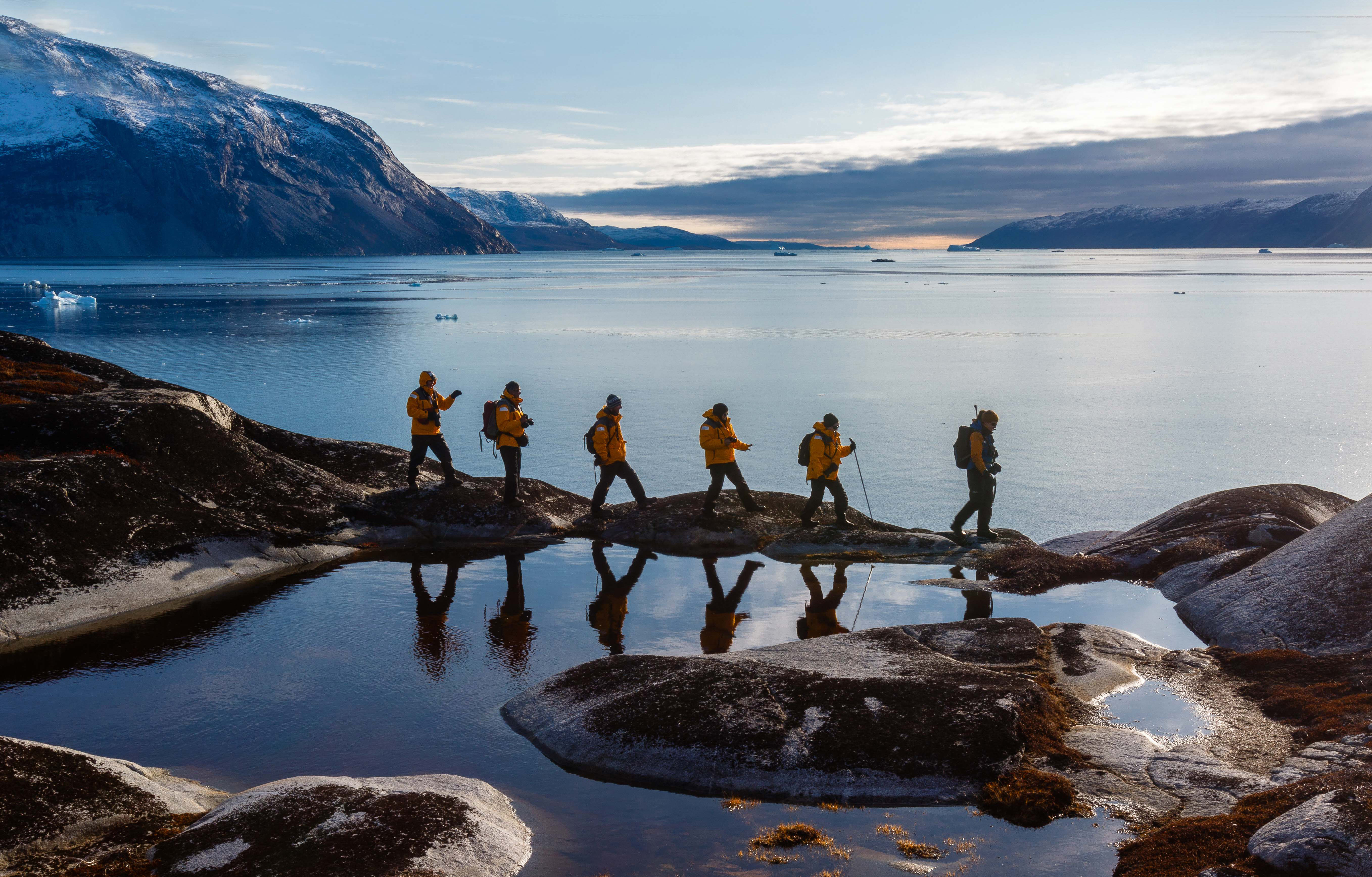
Hiking
Hiking in the polar regions differs from your typical trail experience. Here, in a tree-less terrain, you are the tallest figure on the landscape as you walk over spongy tundra, crusty snow or sandy beaches in remotes parts of the Arctic and Antarctica. Stepping ashore anywhere in the polar regions means you’re not a distant observer.
Our organized hikes range from short jaunts to the top of lookouts or visits to see wildlife or longer walks of several kilometers over ice and rock and snow. Hiking excursions may last from two to three hours with plenty of time for photographs of wildlife, learning moments from your experienced guides, or just time to stand back and admire the incredible polar surroundings.
No experience is necessary but participants should be able to get in and out of a Zodiac and walk on uneven terrain. Hiking options are tailored to all interests and abilities, from those who want to contemplate the landscape in silence to photographers who want that perfect image to energetic travelers who want to summit a peak in the hopes of seeing wildlife in their natural habitat.
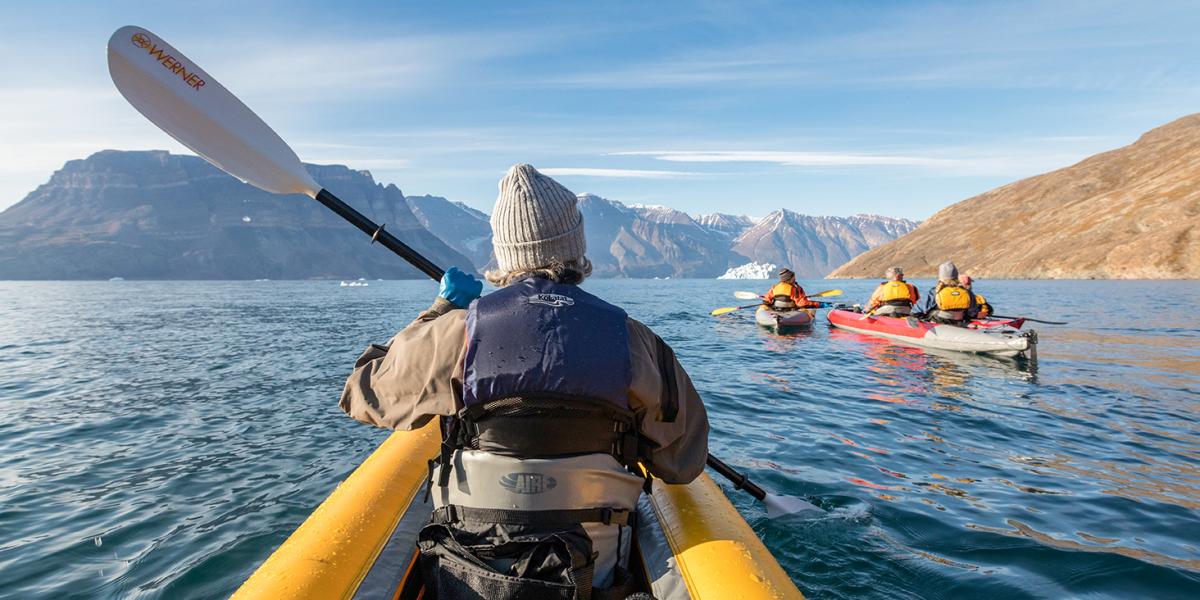
Paddling Excursion
Explore the ocean from a more intimate vantage point on a sit-on-top kayak. No experience is required to manoeuvre these very stable kayaks, allowing you to enjoy an unforgettable experience on the water, taking in breathtaking landscapes and wildlife. Whether it’s your first time in a kayak or you want greater flexibility to try other Adventure options, this shorter excursion is for you.
Paddling in the Polar Regions is highly weather-dependent and a one-time experience. Your kayak guides will attempt to take you out on the water for 1-1.5 hours of paddling. Offered on most voyages, spaces are limited. All equipment, guides and instructions are provided by Quark.
Pricing subject to change based on season. Please proceed to checkout or contact a Polar Travel Adviser for more details.
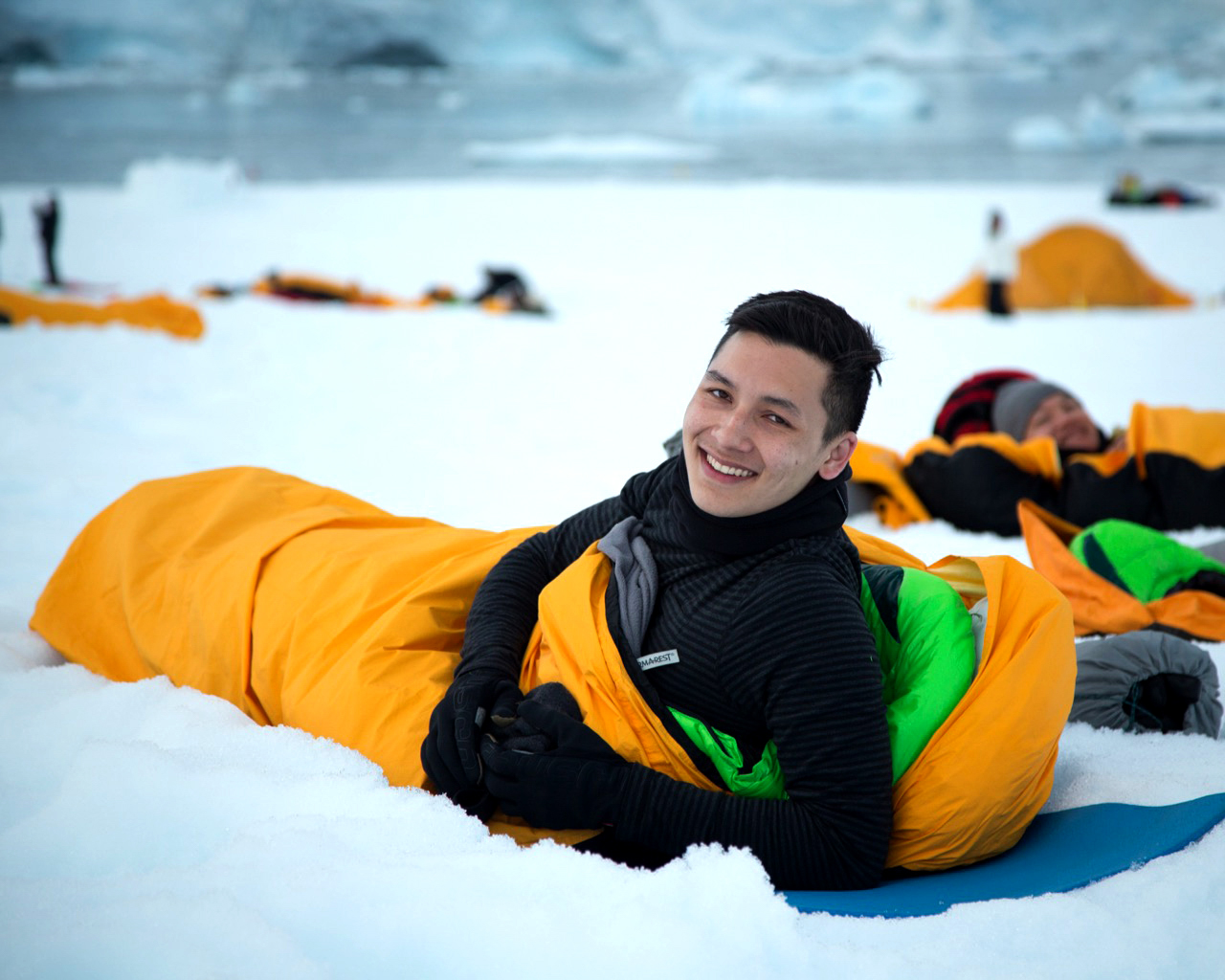
Camping
Imagine for a moment, staring at the stars in the indigo glow of an Antarctic night as you bed down for the night outside in the elements. The buzz of your daily life becomes a distant memory as you listen to the bray of penguin, the ethereal calls of the Weddell sea – even the exhalation of a humpback whale. And then you fall asleep.
Antarctic Camping with Quark Expeditions is an unforgettable experience. After dinner onboard, you’ll be escorted ashore by Zodiac to camp out on the snow for the night in your ready-to-roll bivy sack (tents can be used upon request). Once you decide on your spot, you set up camp and enjoy the peace as the Antarctic night unfolds.
Camping in Antarctica is limited to 50 participants, all of whom will be briefed beforehand on the principals of basic camping. Prior to you settling down for the night, Quark Expeditions staff will prepare the site, including setting up a perimeter in safe, flat to gently-sloping and beautiful site. You’re free to choose where (within the perimeters) you want to settle down for the night.
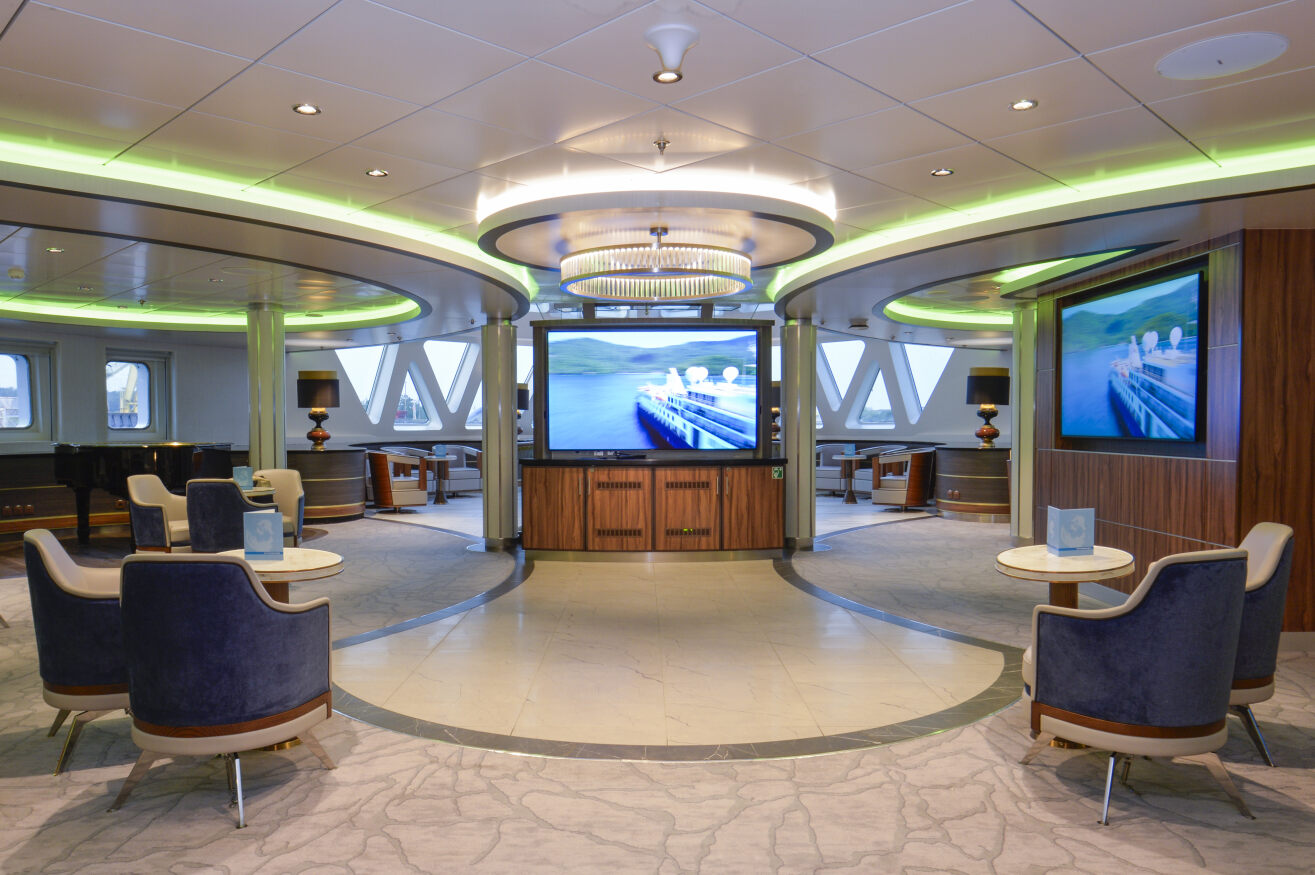
Explorer Lecture Lounge
Enjoy daily chats with and presentations by our world-class onboard polar experts—expedition guides, specialists, photography guides and other special guests who will introduce you to the fascinating history, biology, ornithology, glaciology and geology of the region, and much, much more.
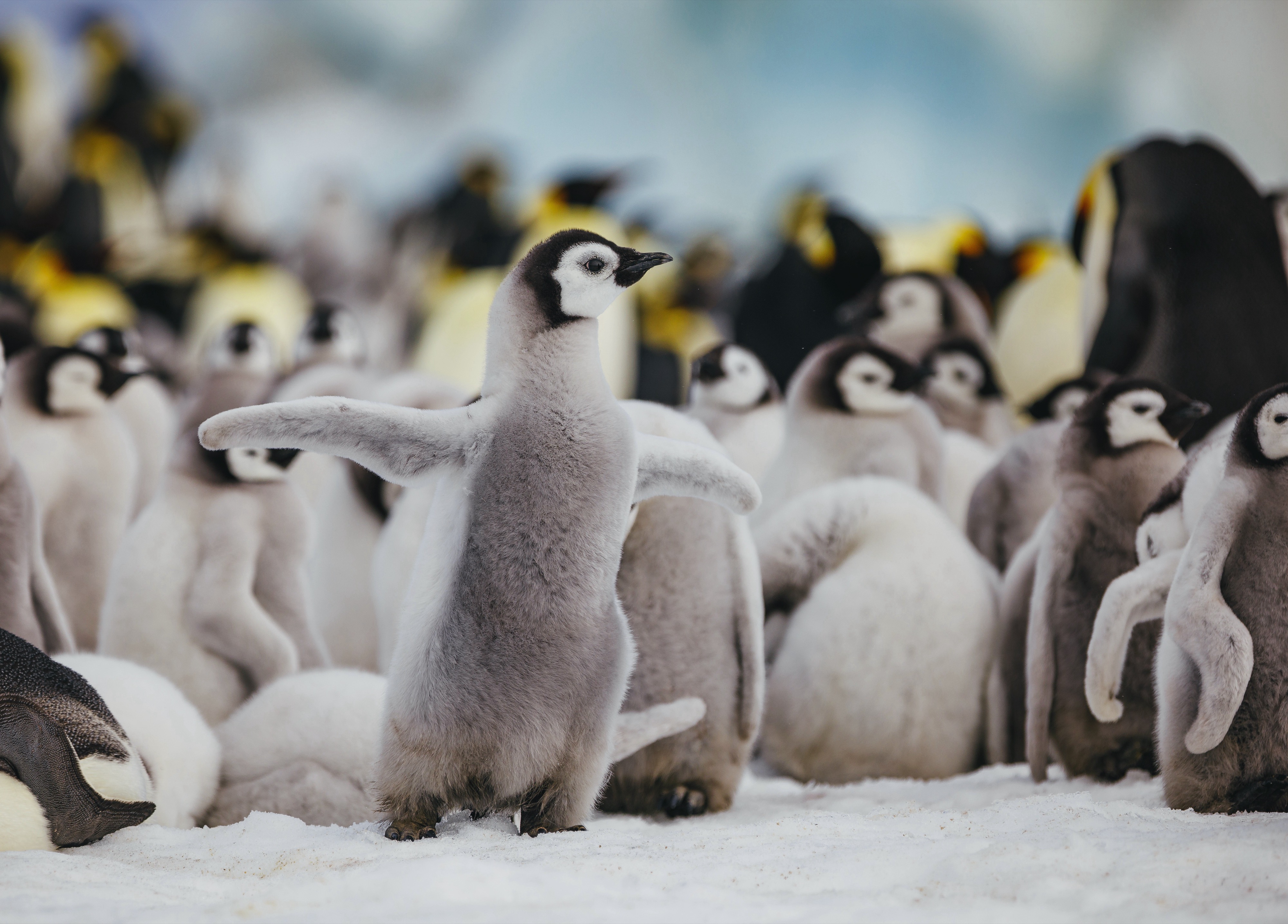
Photography
Documenting your voyage so you can take the memories home is a rewarding experience. Our photography guides will help you hone your skills to capture the beauty of the polar regions.
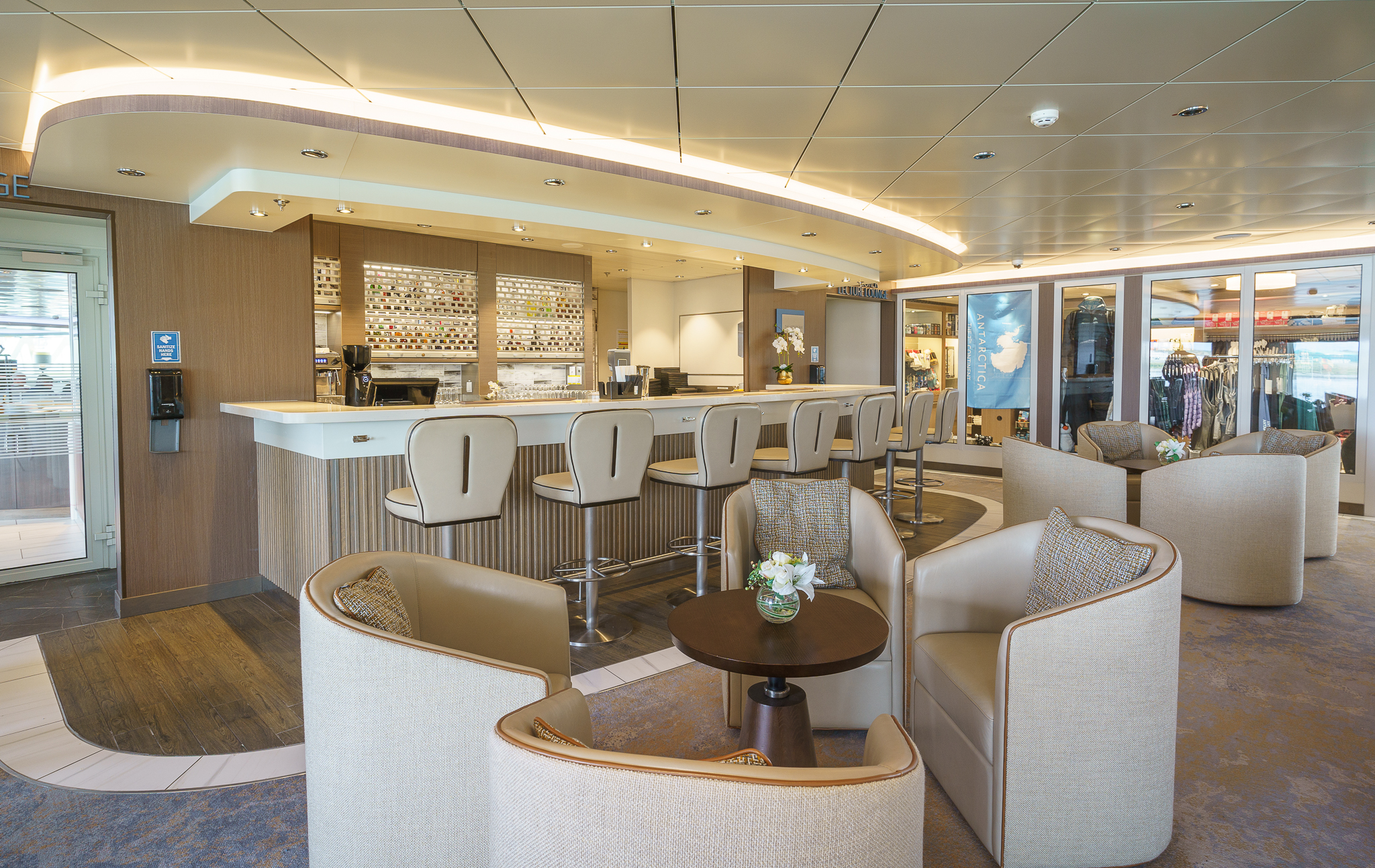
The Latitude Bar
A popular social hub on Deck 5, the beautifully-lit Latitude Bar—with its lush sofas and faux marble-topped end tables—is large enough to seat 46 and is ideal for enjoying a quiet drink on your own or hanging out with friends.
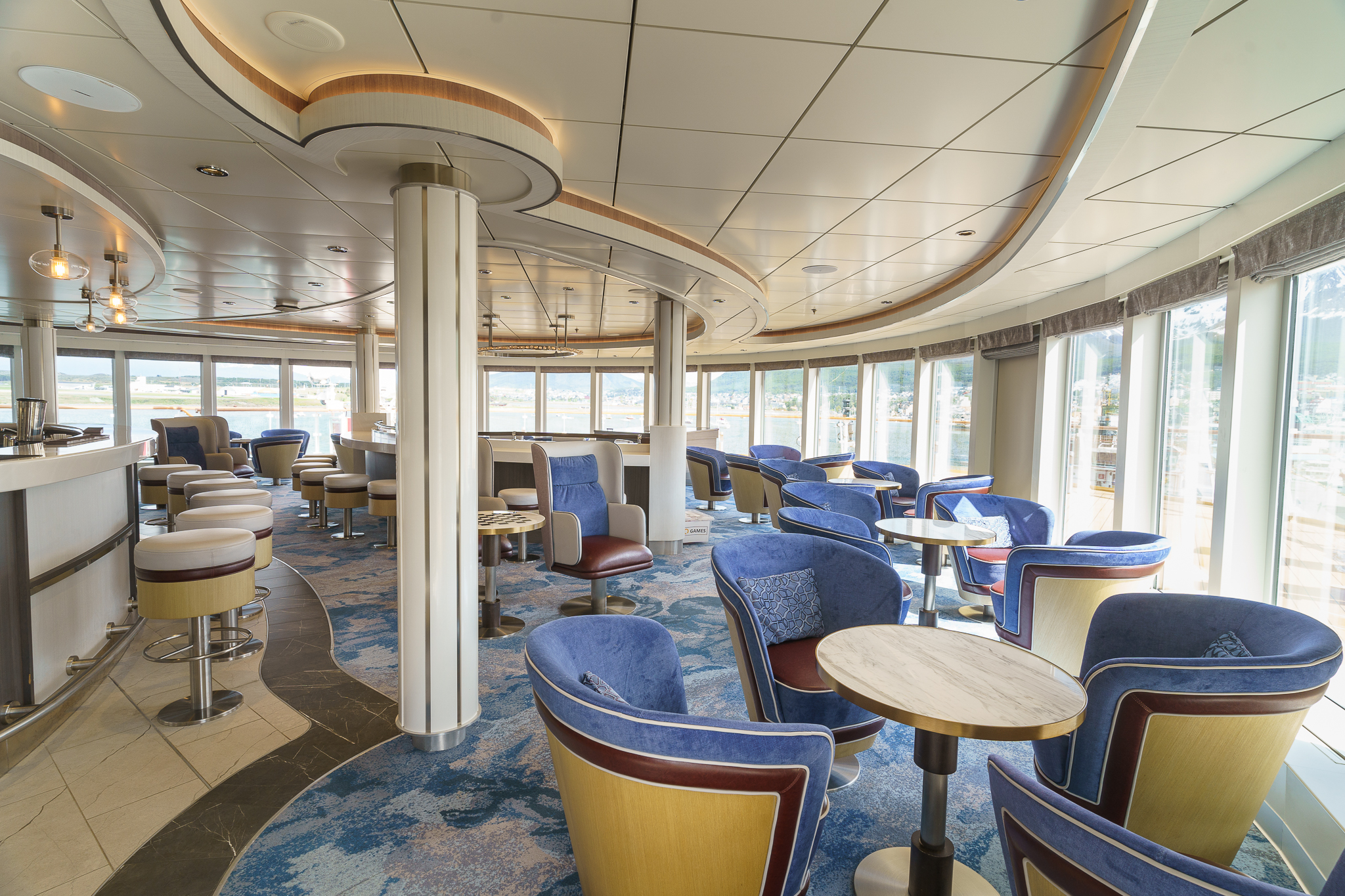
Observation Lounge
This stylish lounge at the top of the ship guarantees incredible views. Guests also frequent this spacious lookout on Deck 8 to enjoy cocktails and conversation with fellow travelers. Seats 63.
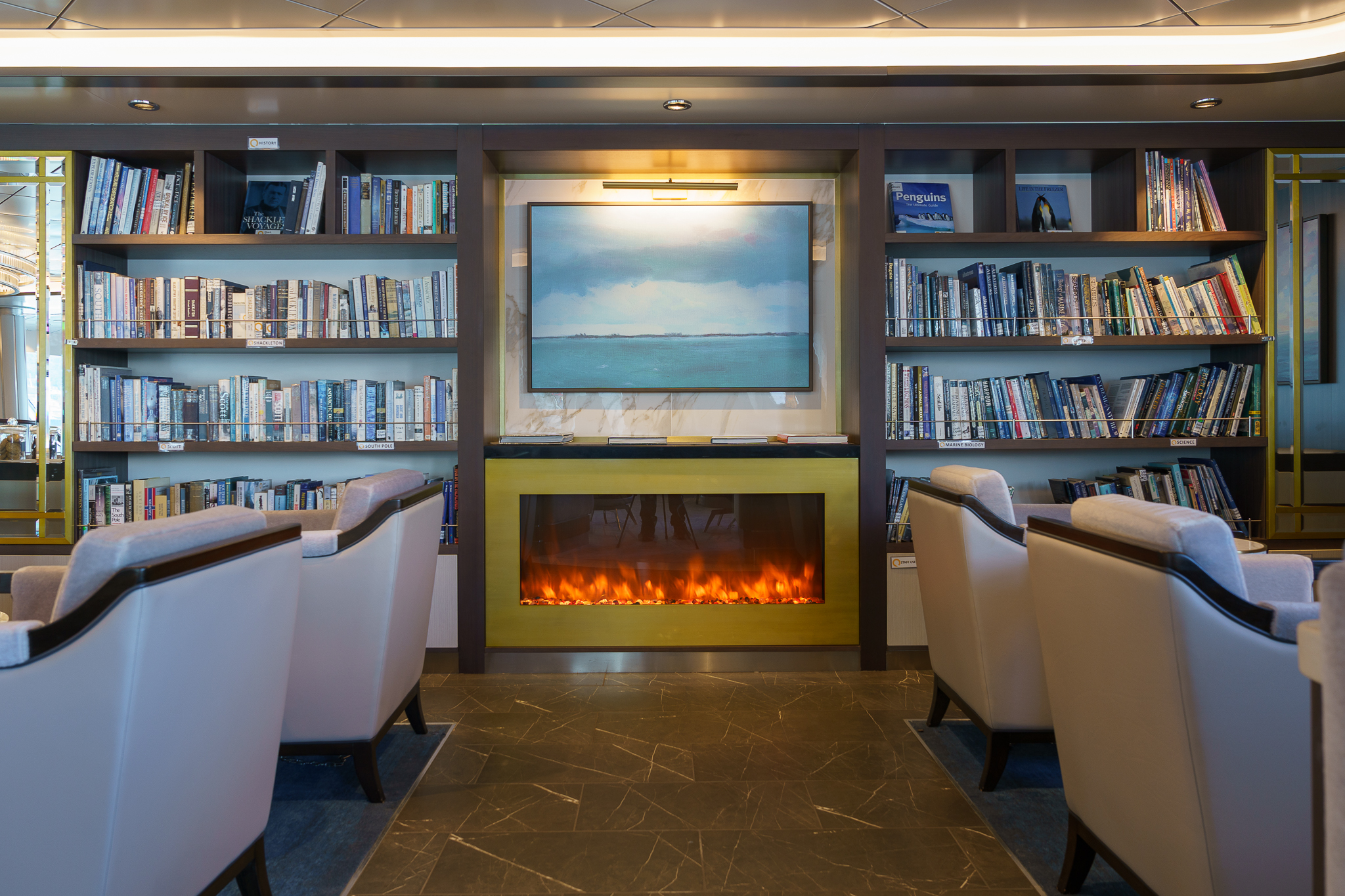
Discovery Library
Located on Deck 6 at the top of the gorgeous atrium staircase, this beautiful Library with floor-to-ceiling glass, accommodates up to 47 people
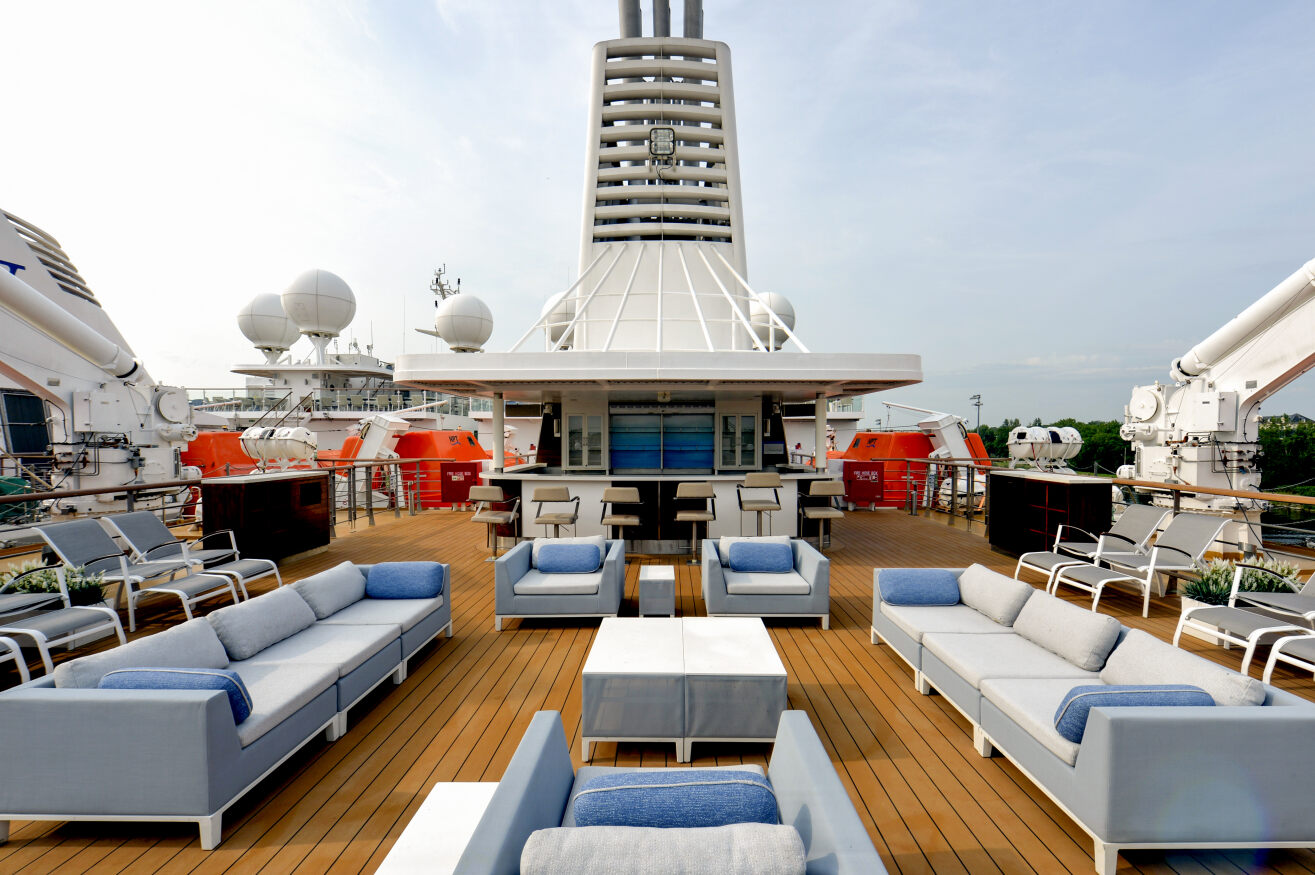
Sun Deck and Bar
More information coming soon.
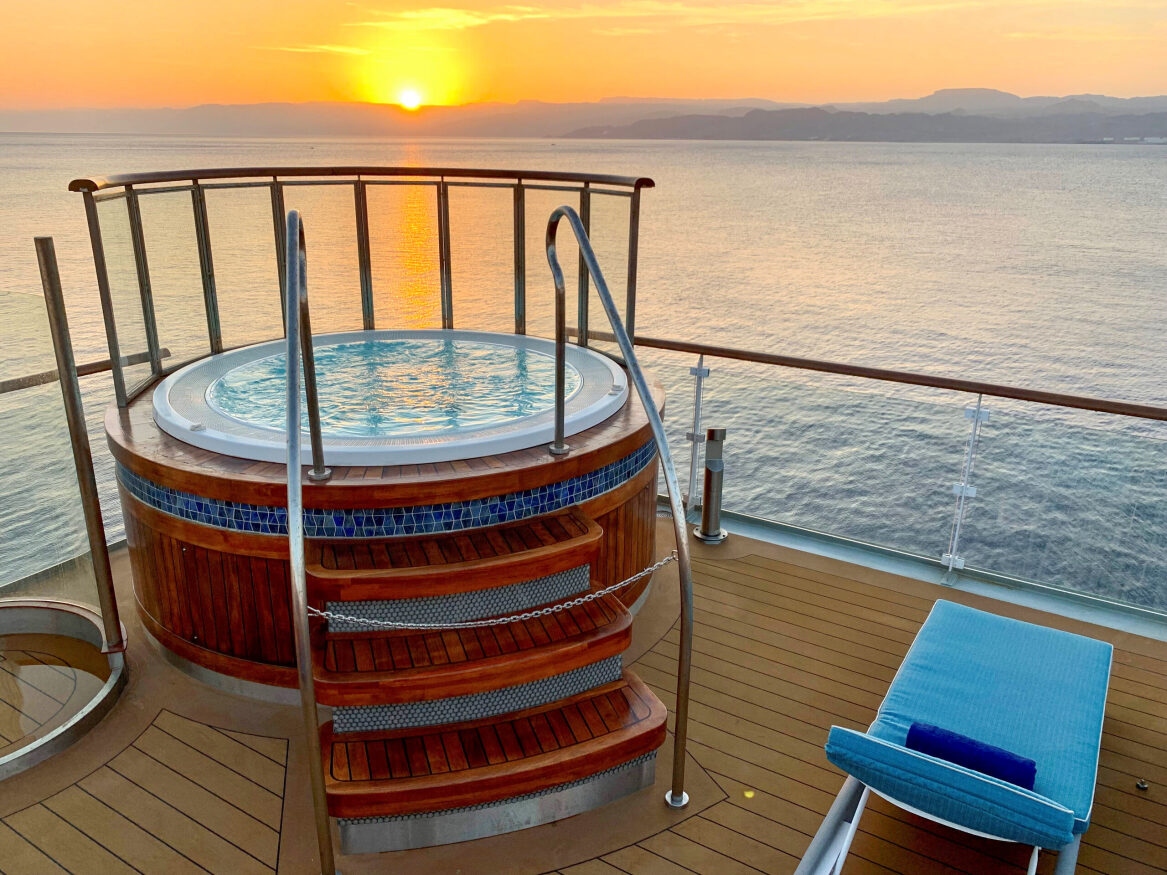
Jacuzzis
Two outdoor Jacuzzis on deck 7, at the ship’s stern, mean you can relax alfresco while soaking up the breath-taking polar views.
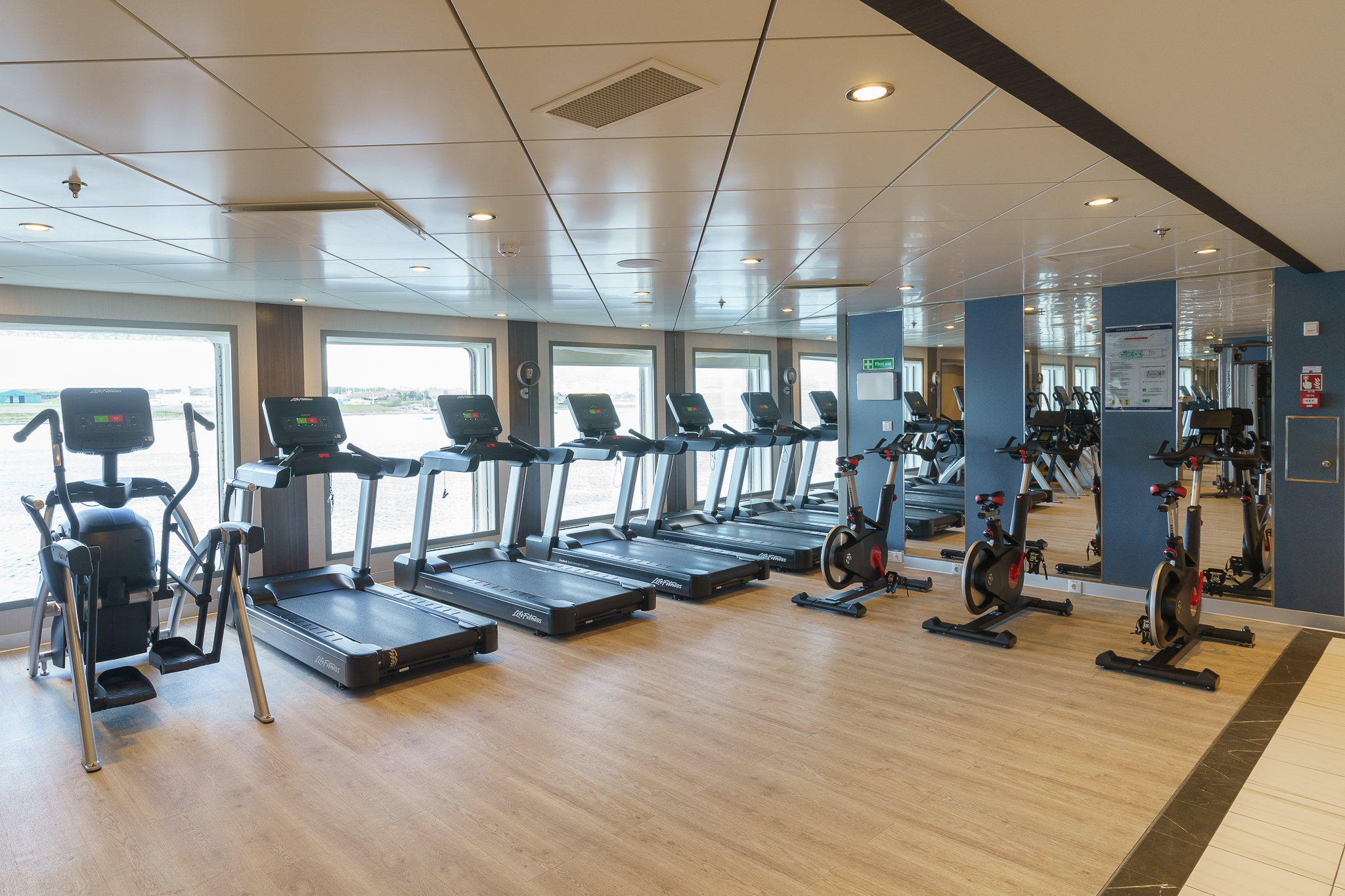
Fitness Centre
Stay fit with the latest work-out equipment in the Fitness Center on Deck 7.
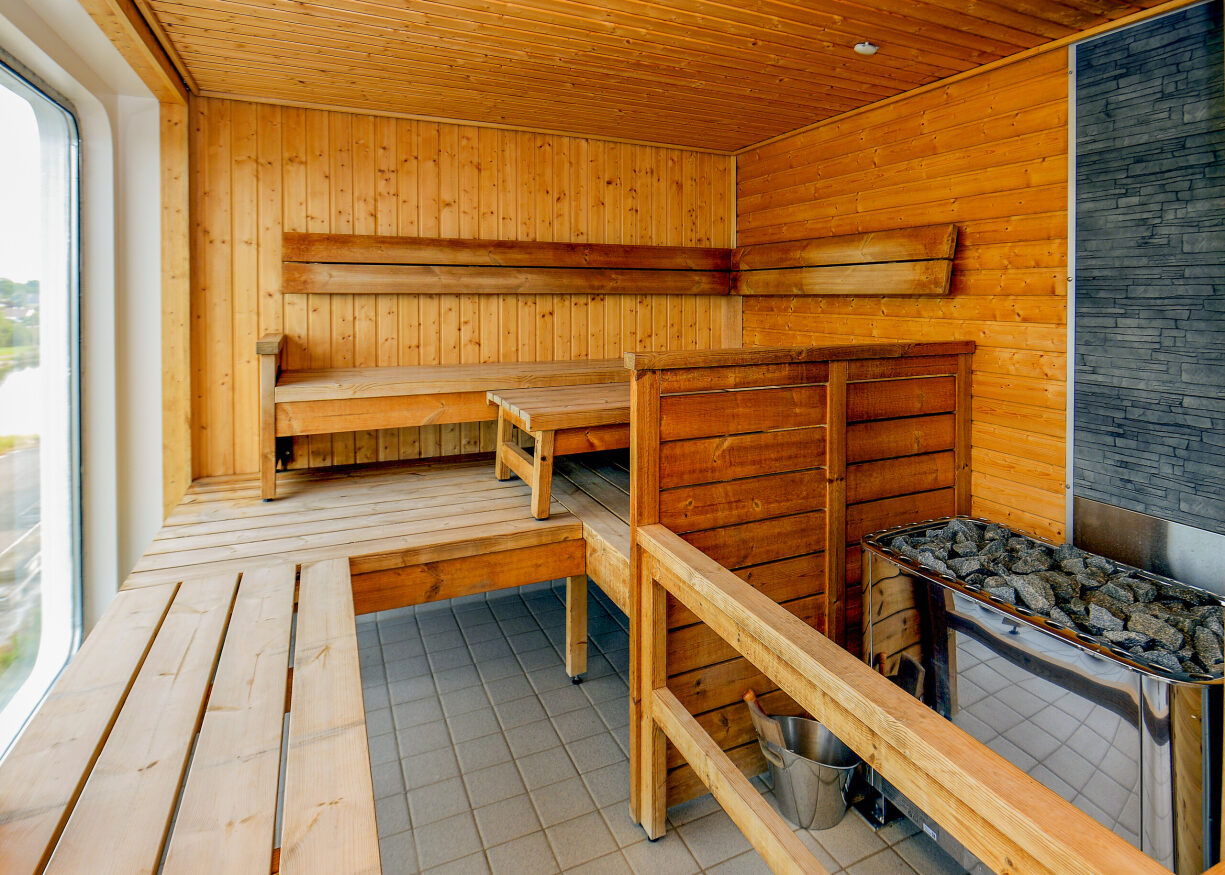
Dry Sauna
After a day of exciting off-ship adventure, guests can relax on the sauna’s traditional wood benches while gazing at the polar wilderness just outside the large sauna windows. Accommodates 15 people on Deck 7.
Leading Edge Sustainability
With the latest sustainability technology in polar expedition, the ship features fuel-efficient Rolls-Royce engines and the ground-breaking MAGS gasification system that converts waste into energy, eliminating the environmental impact of waste transportation.
Medical Facilities
Quark Expeditions provides an English-speaking doctor on board who manages a medical clinic stocked with a supply of common prescription medicines and basic first aid equipment.
If you are under regular treatment for any ailment, you must bring a sufficient supply of medicine. We recommend that you pack an extra two weeks’ supply of medication in case of emergency. We cannot accept responsibility for not having a specific brand or type of drug on board. Should you fall ill, the doctor will refer to the medical forms that you completed and returned to us; therefore it is vital that the information you provide is complete and accurate
Dress Code
The dress code on the ship is casual, though some may choose to dress up a little for the Captain’s Welcome Reception.
Smoking Policy
To protect the health and safety of its guests, Quark Expeditions® maintains a no smoking policy in the interior of the ship including cabins, near Zodiacs and on landings. Smoking on the ship is permitted in the designated smoking area only, which your Expedition∘ Team members will be happy to point out for you. Always make sure to extinguish cigarettes properly and dispose of them in the proper receptacle. Please, never throw cigarettes overboard.
Dietary Requirements and Allergies
All guests—including vegetarians, meat-eaters, as well as those who follow a gluten-free diet—will be equally impressed with the dining options on our ships. Quark Expeditions® is able to cater to most special dietary requests, as long as you clearly indicate your needs on the required expedition forms when you book your voyage. Menus will be clearly labeled for vegetarian and gluten free options, but please do notify your server of the dietary restrictions you indicated on your form. We regret that kosher food cannot be prepared.
Laundry
A complete list of laundry fees will be provided on board. Laundry is collected each morning; please allow 48 hours for your laundry to be returned. Ironing services are also available at a minimal charge. We encourage you to take advantage of the laundry services, as it will mean you can pack fewer articles of clothing. If you prefer to hand wash small items in your cabin, please remember to bring environmentally friendly detergent.
Wi-Fi & Communications
When you are not busy exploring the natural beauty of the Polar Regions, you may wish to connect with family and friends back home to share some of your voyage highlights. Guests on Quark Expeditions can now enjoy free Wi-Fi as part of our “Raise a Glass and Stay Connected Free” program. This complementary Wi-Fi service permits basic Internet browsing and voice applications.
Please note that we travel to some of the most remote parts of the world. As we utilize satellite equipment for our connection, Wi-Fi signal may be intermittent.
To access email or internet on your personal computer, tablet or smart phone, connect to the network on your device, where you can access our complimentary plan, or purchase Priority Wi-Fi.
Complimentary Wi-Fi
- Lower speeds
- Suitable for basic internet browsing, texting and voice calling using text and voice apps
- Some site filtering
- No charge
- One device logged in at a time
Priority Wi-Fi
- Higher speeds
- Suitable for larger data volume apps, video calling, video streaming (in lower resolutions) etc.
- See rates by logging in
- One device logged in at a time
Expedition Brochures
Find Ocean Explorers itineraries here.

Deck 9
- Top Deck

Deck 8
- Observation Deck
- Observation Bistro
- Observation Lounge & Bar
- Elevator

Deck 7
- Penthouse Suite
- Owners Suite
- Veranda Stateroom
- Studio Veranda Single
- Polar Deck and Bar
- Jacuzzis
- Gym
- Tundra Spa & Sauna
- Bridge
- Bridge Deck
- Elevator

Deck 6
- The Discovery Library
- Junior Suite
- Veranda Suite
- Veranda Stateroom
- Elevator

Deck 5
- Main Dining Room
- Private Dining Room
- Reception
- Polar Boutique
- Latitude Bar & Lounge
- Explorer Lecture Lounge
- Elevator

Deck 4
- Deluxe Veranda Forward
- Veranda Suite
- Veranda Stateroom
- Expedition Desk
- Elevator

Deck 3
- Ready Room
- Medical Facilities
- Zodiac Embarkation Points
- Studio Single
- Elevator
